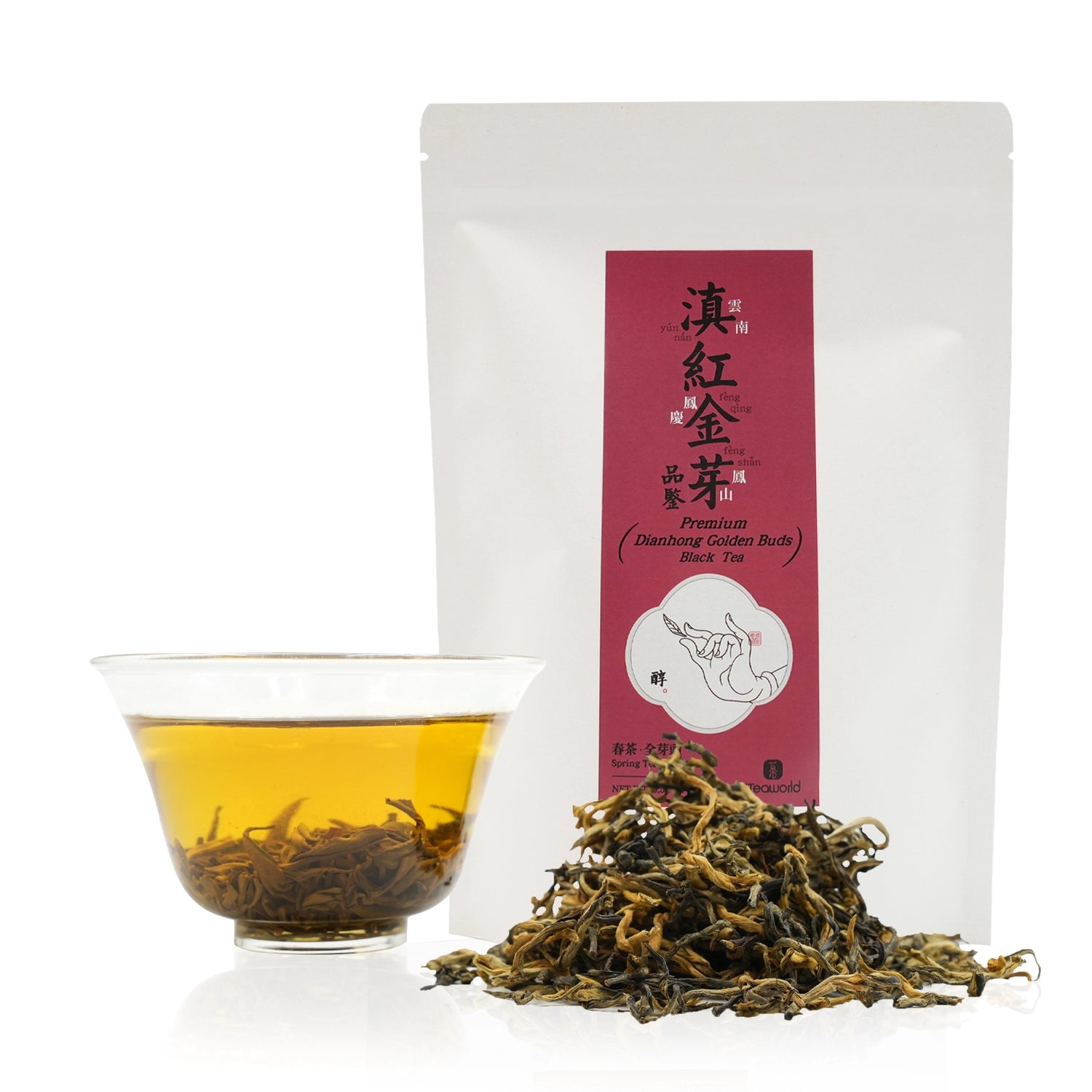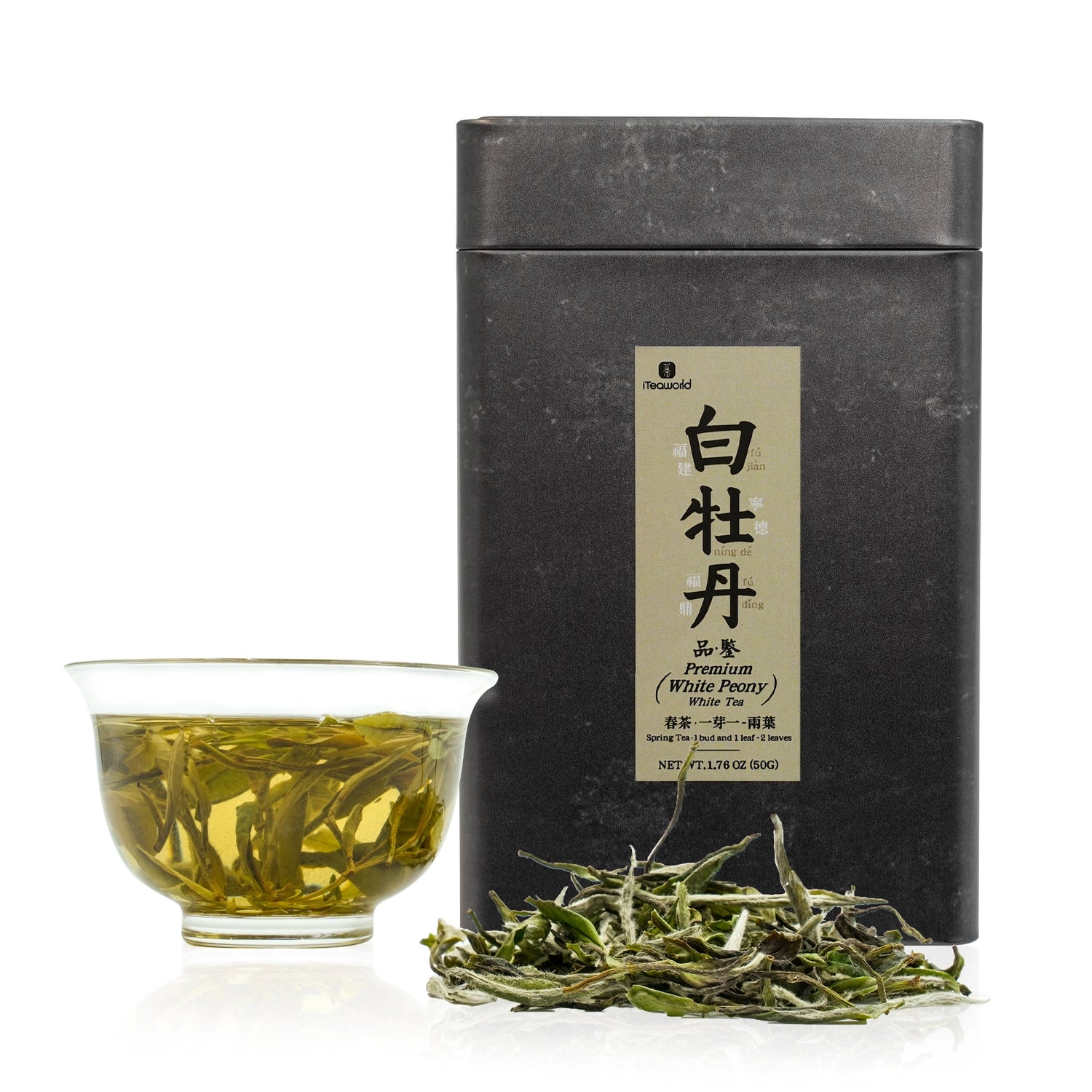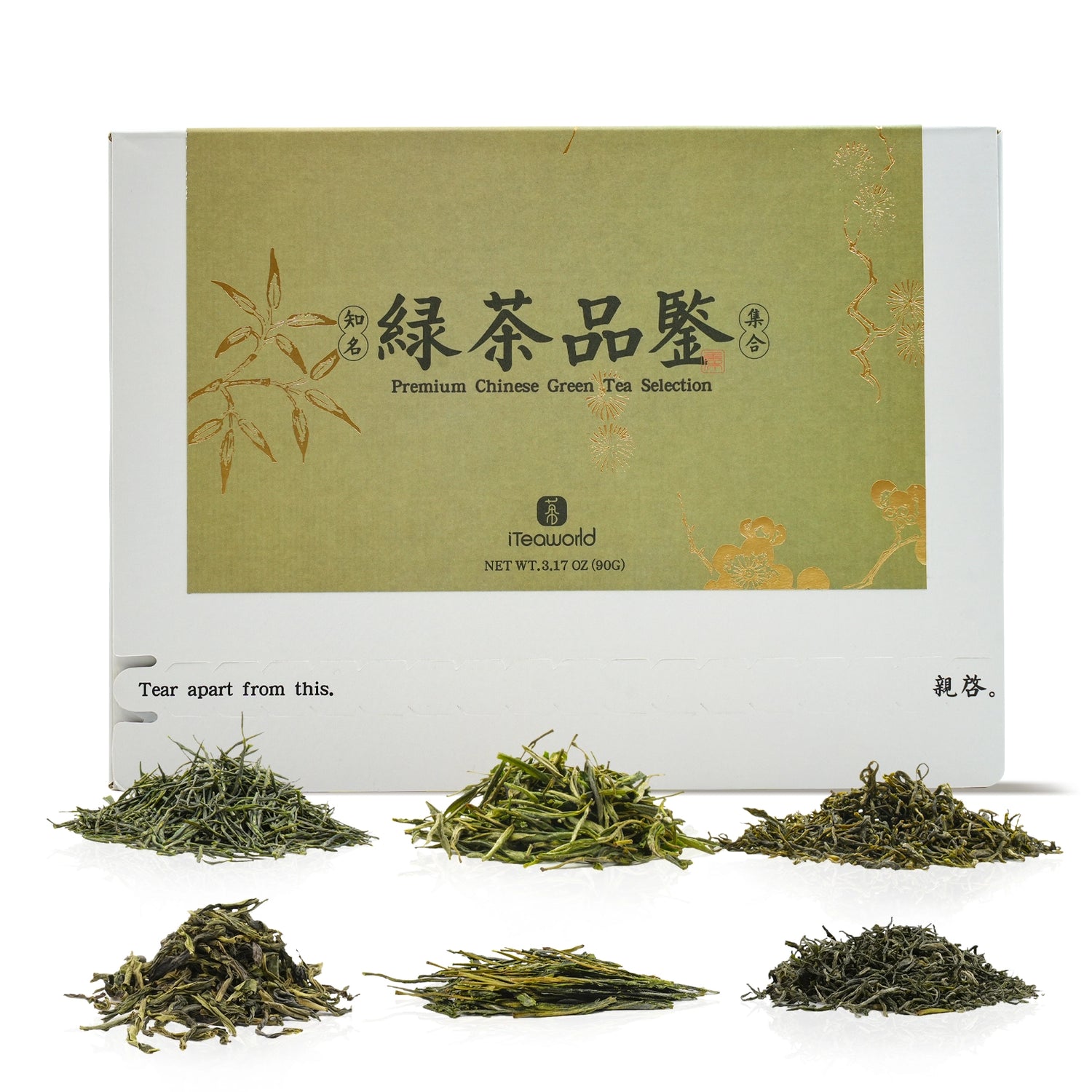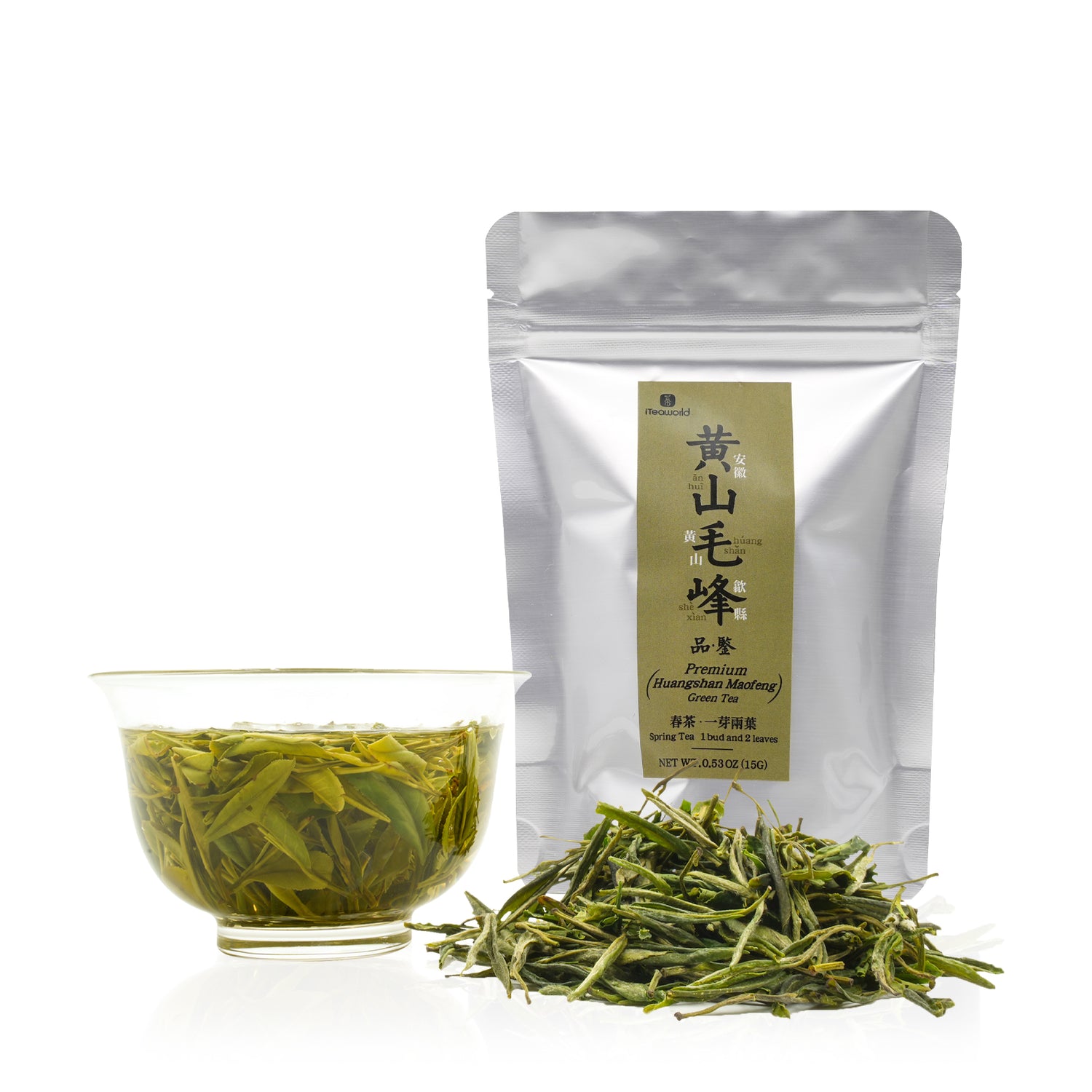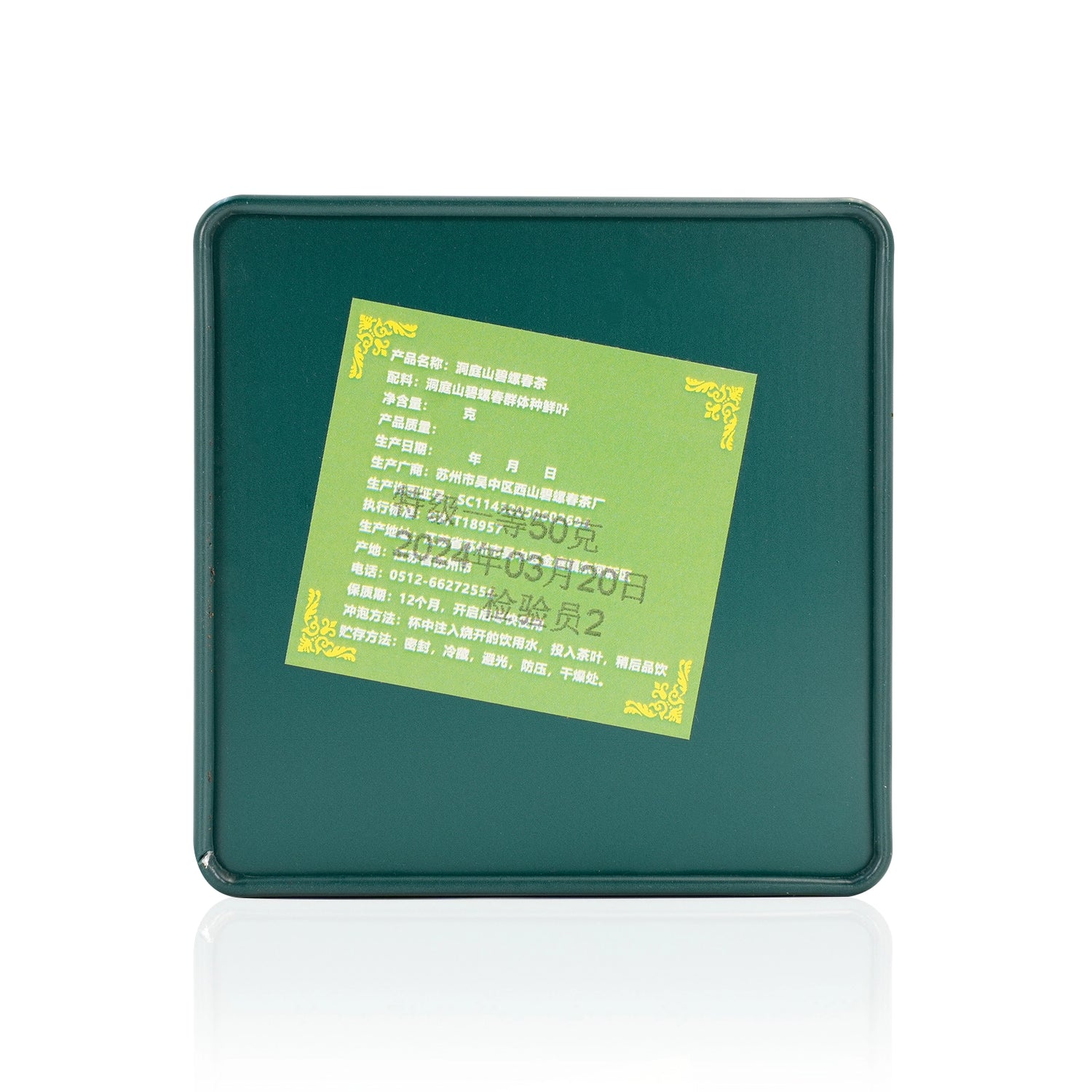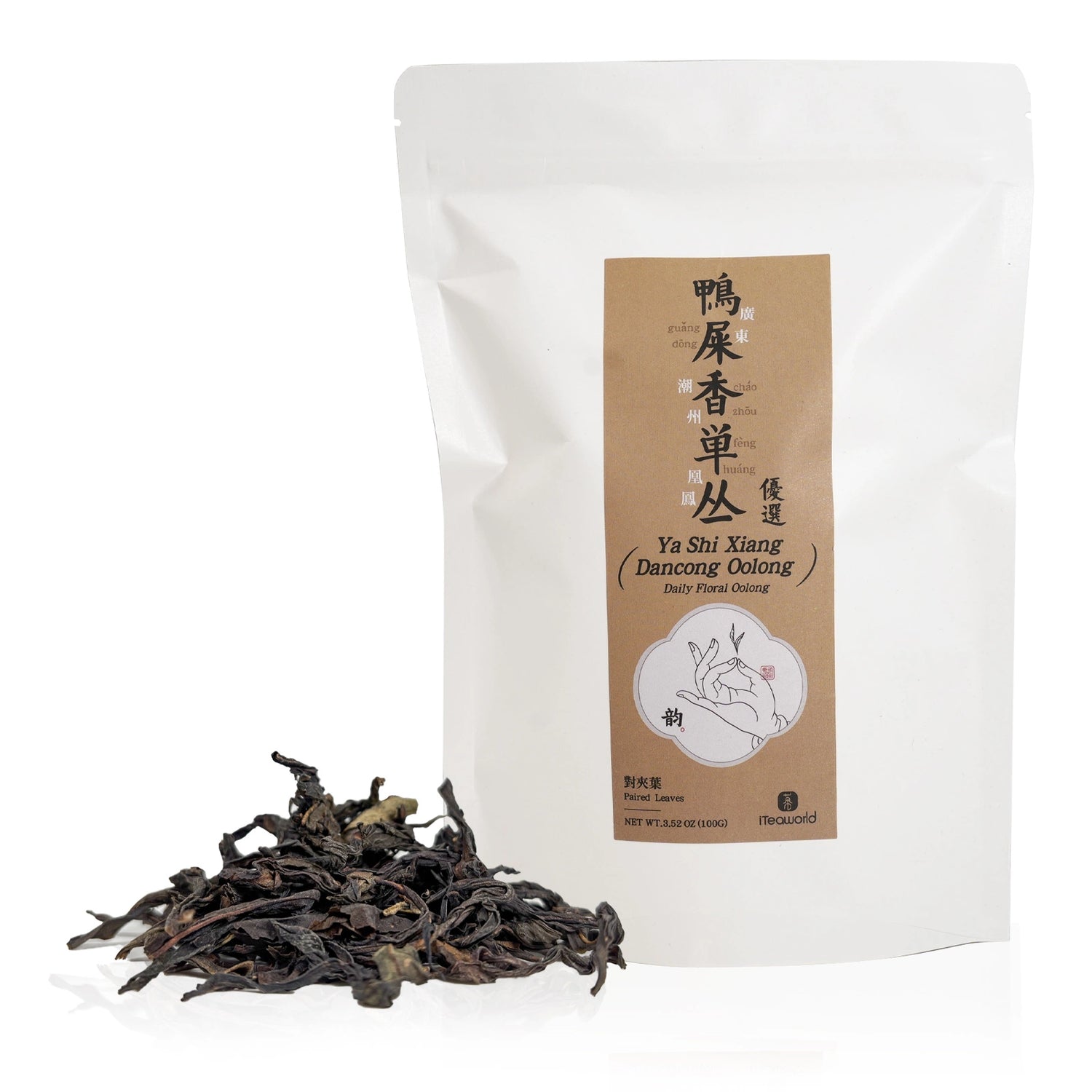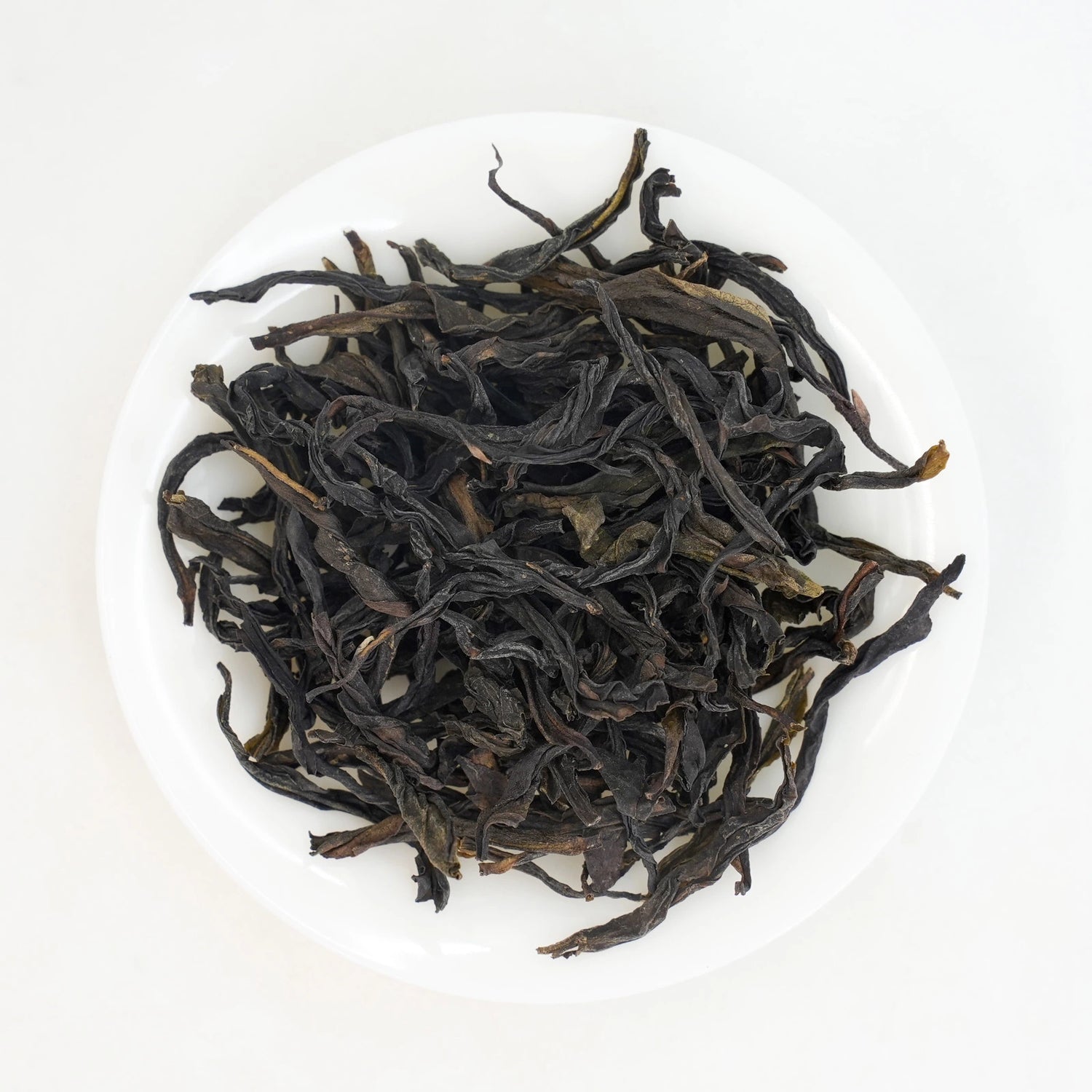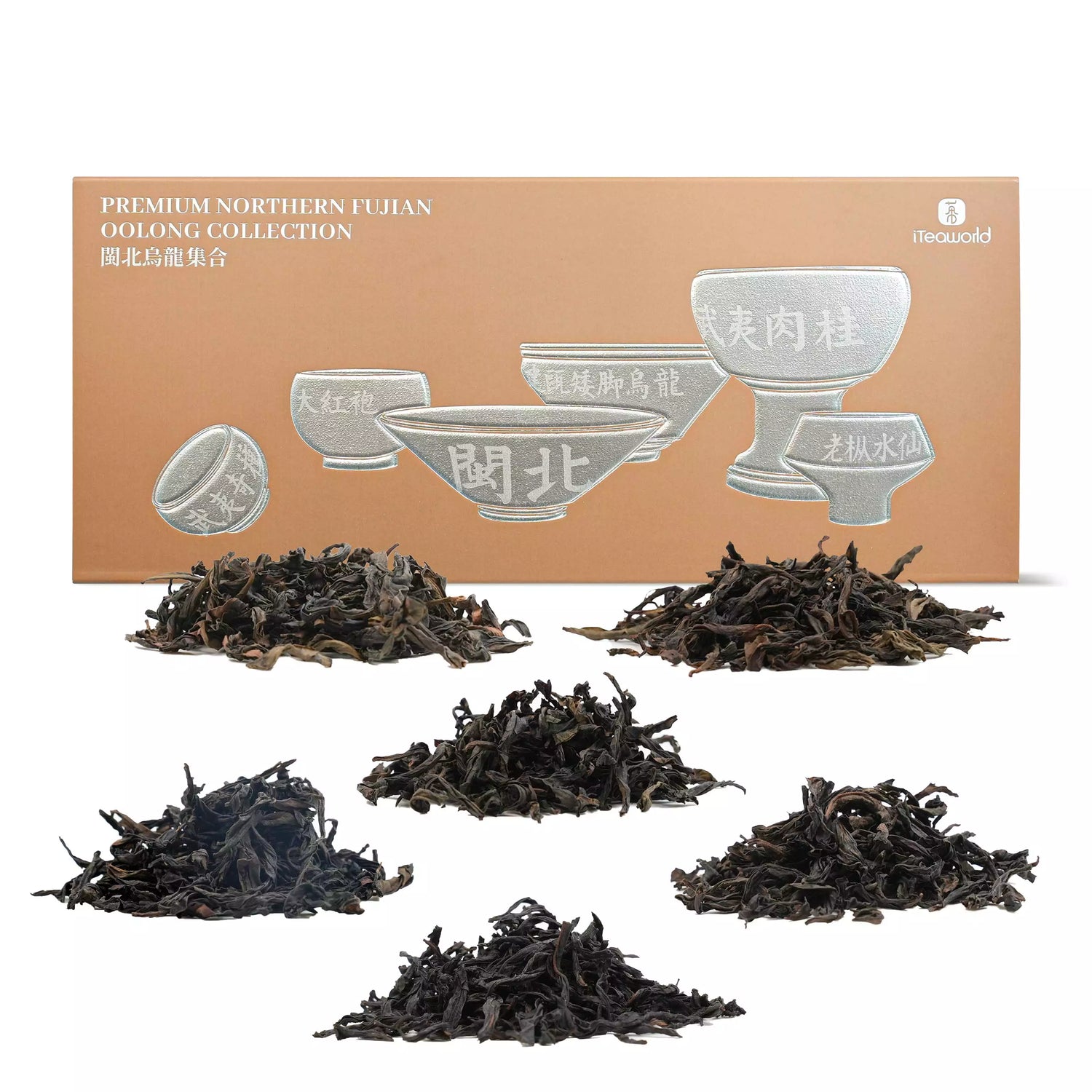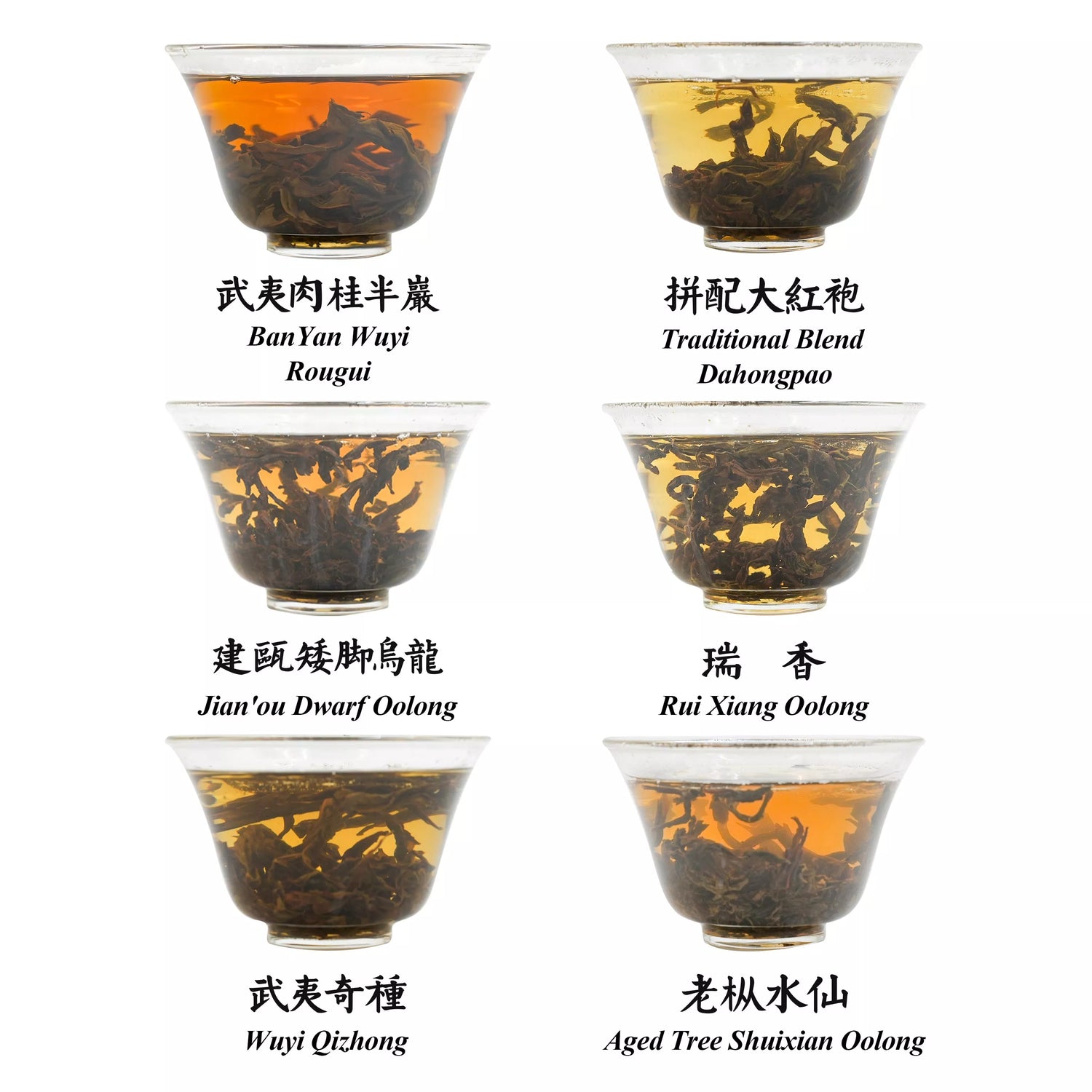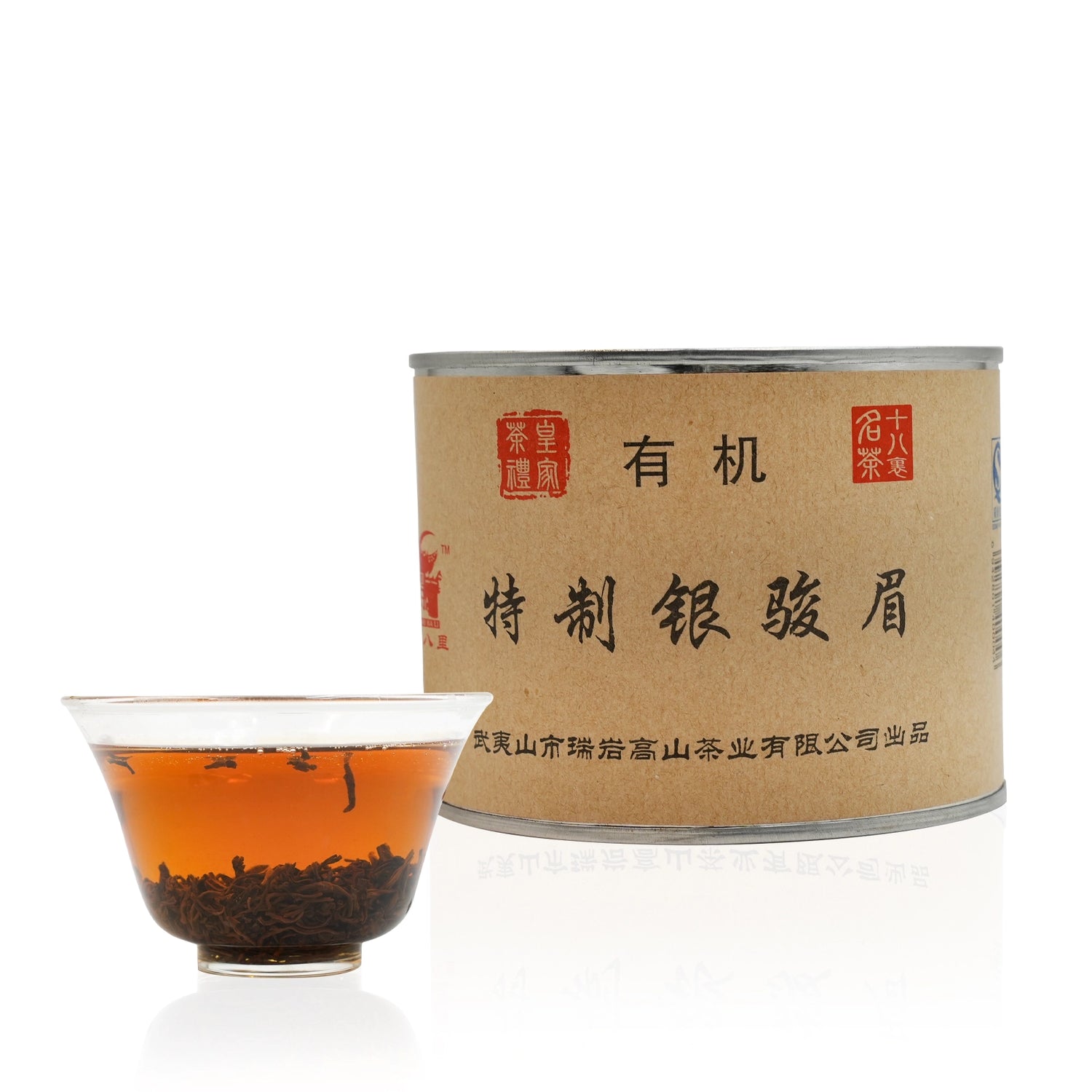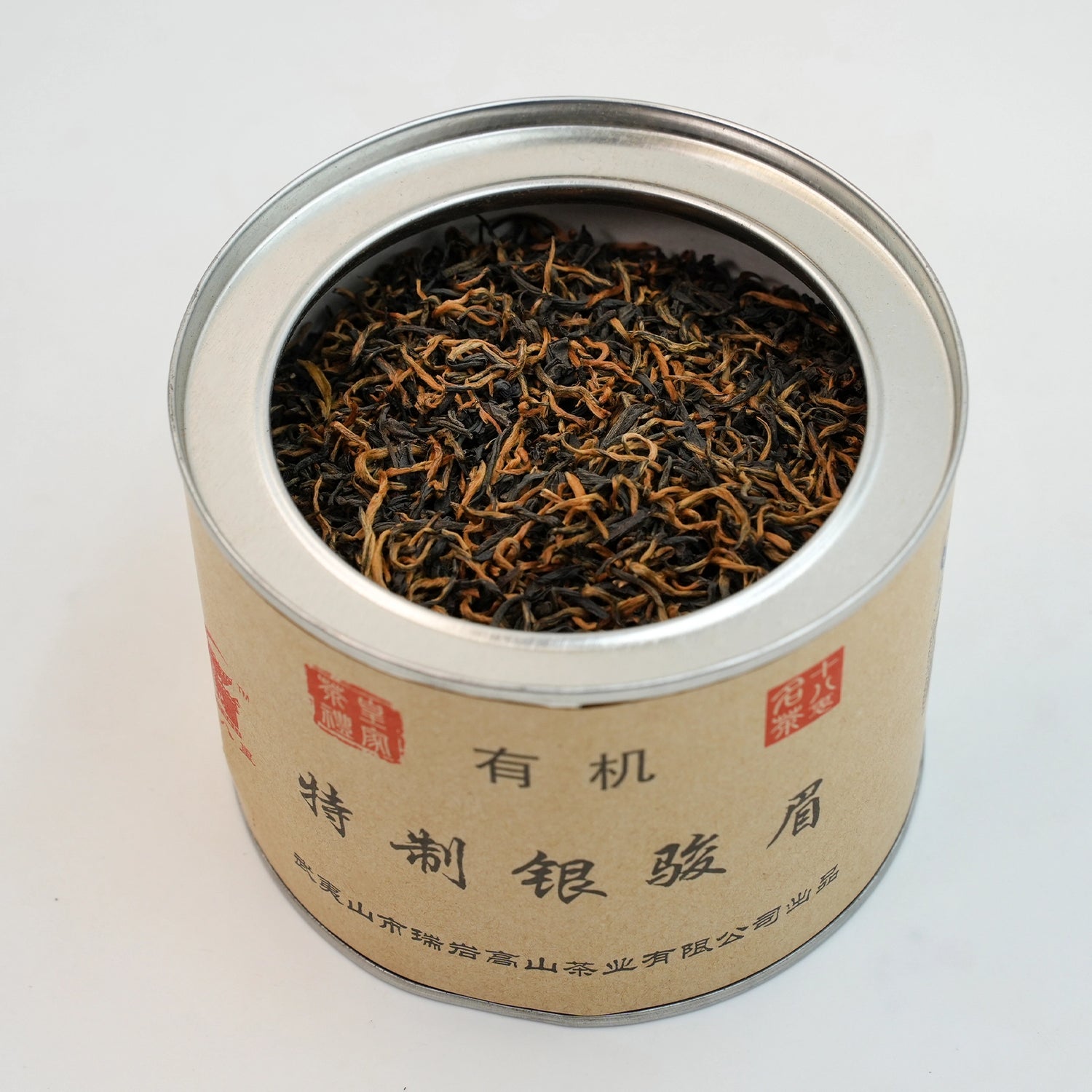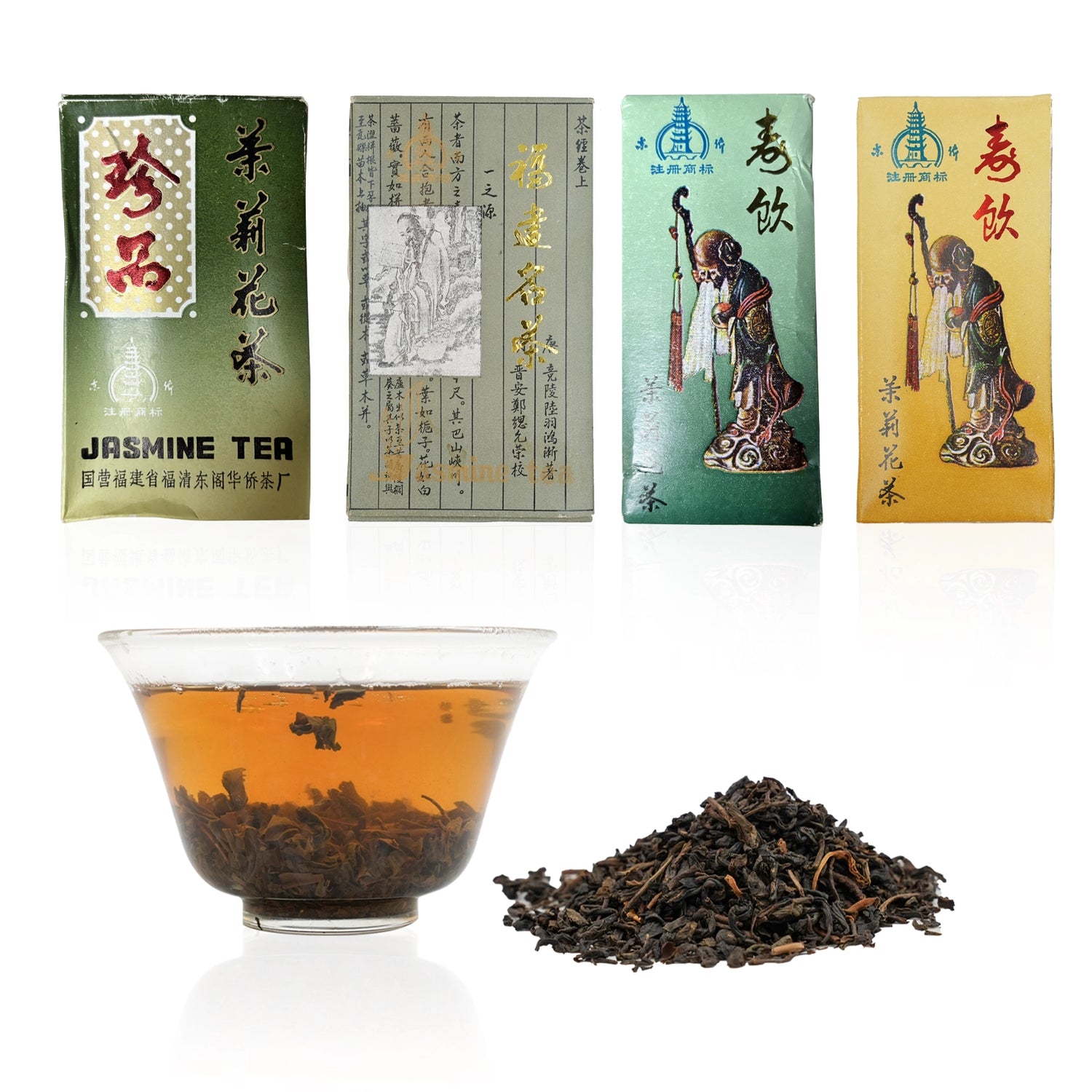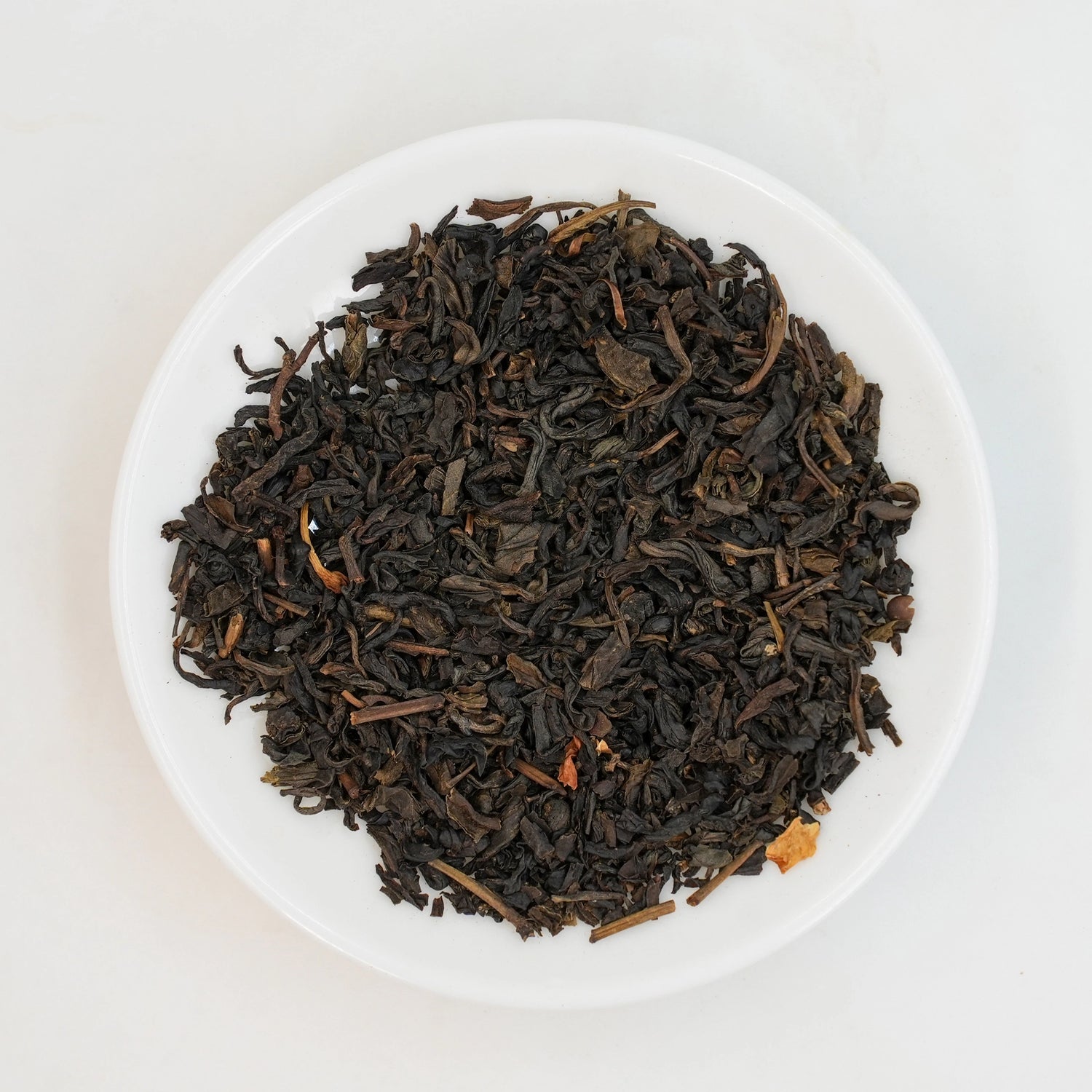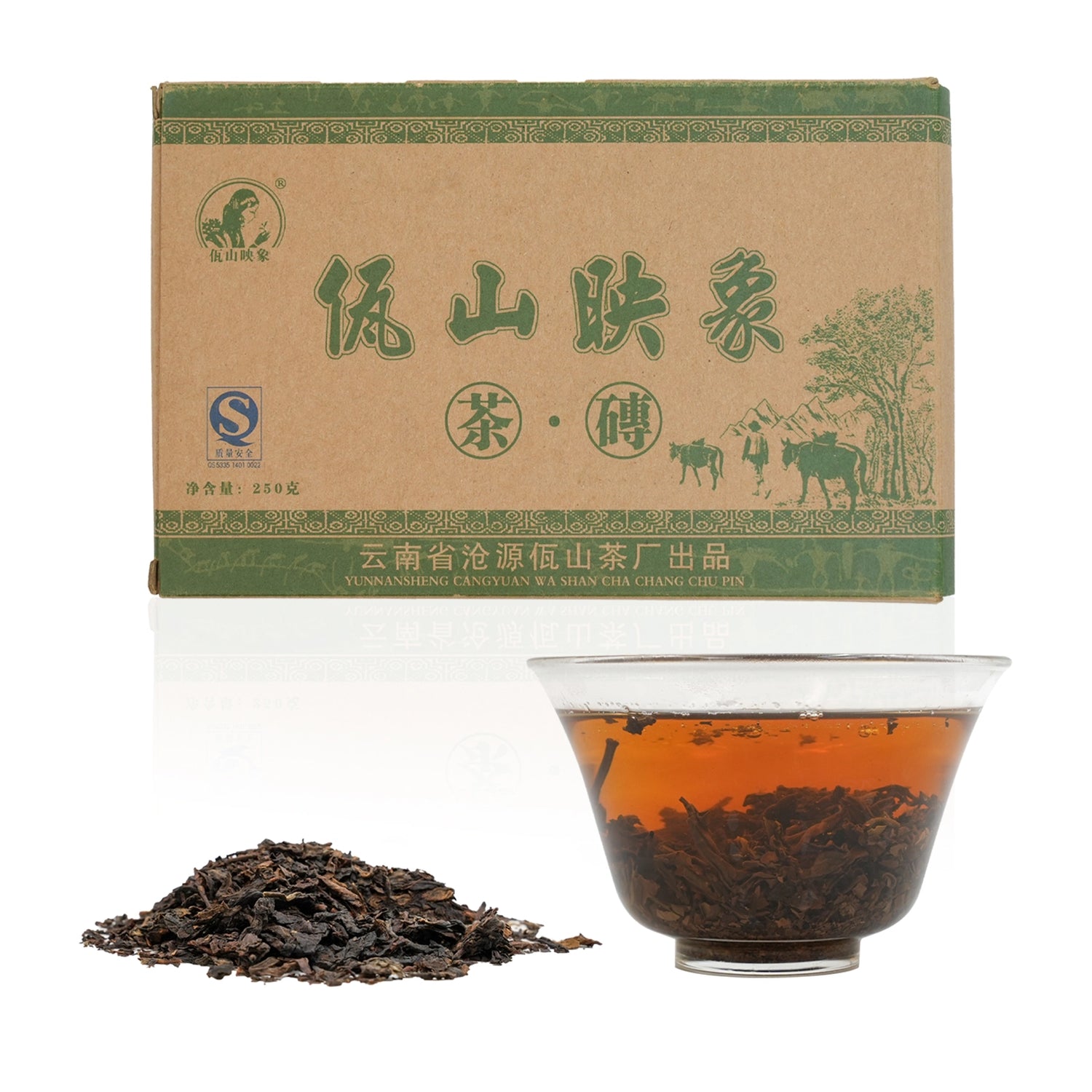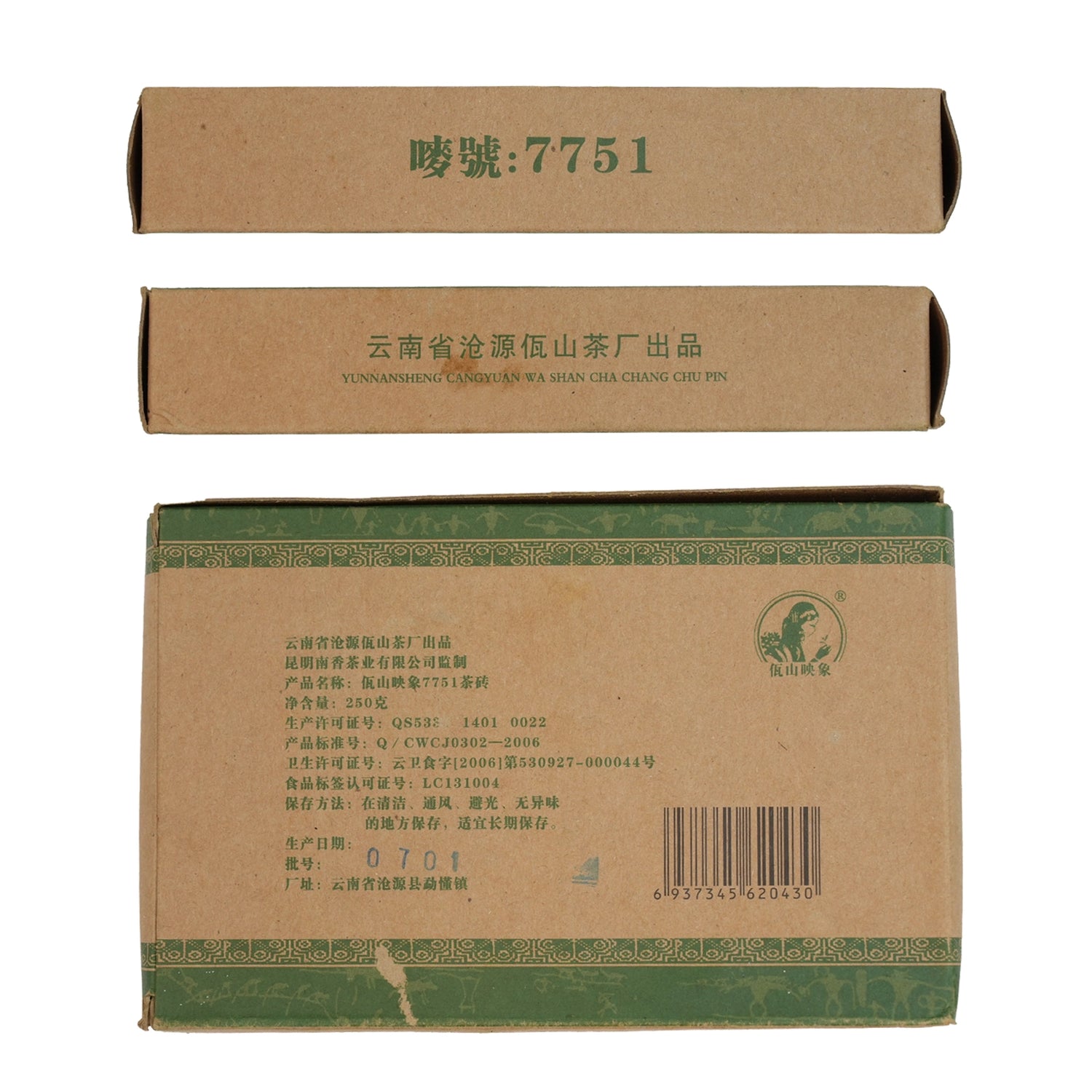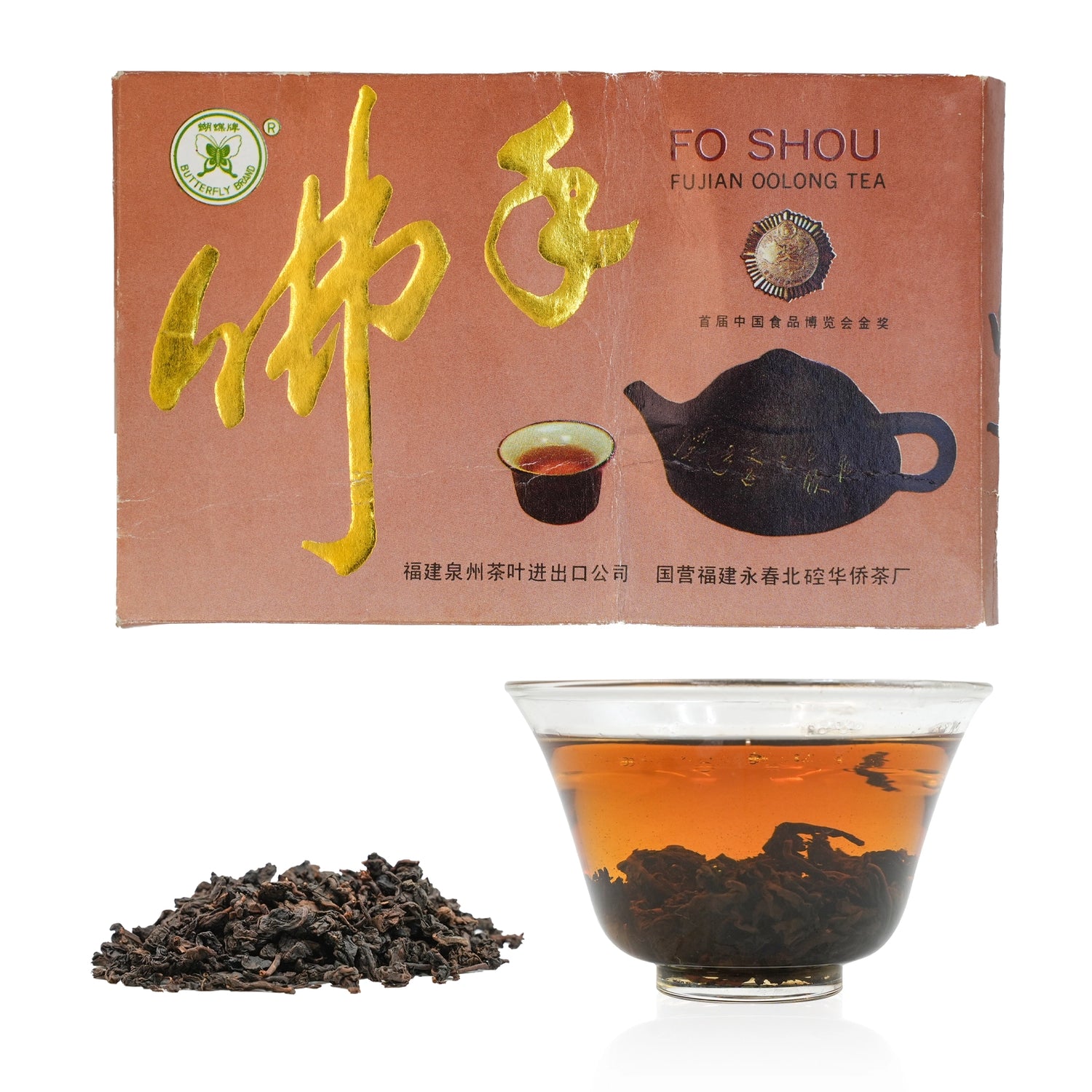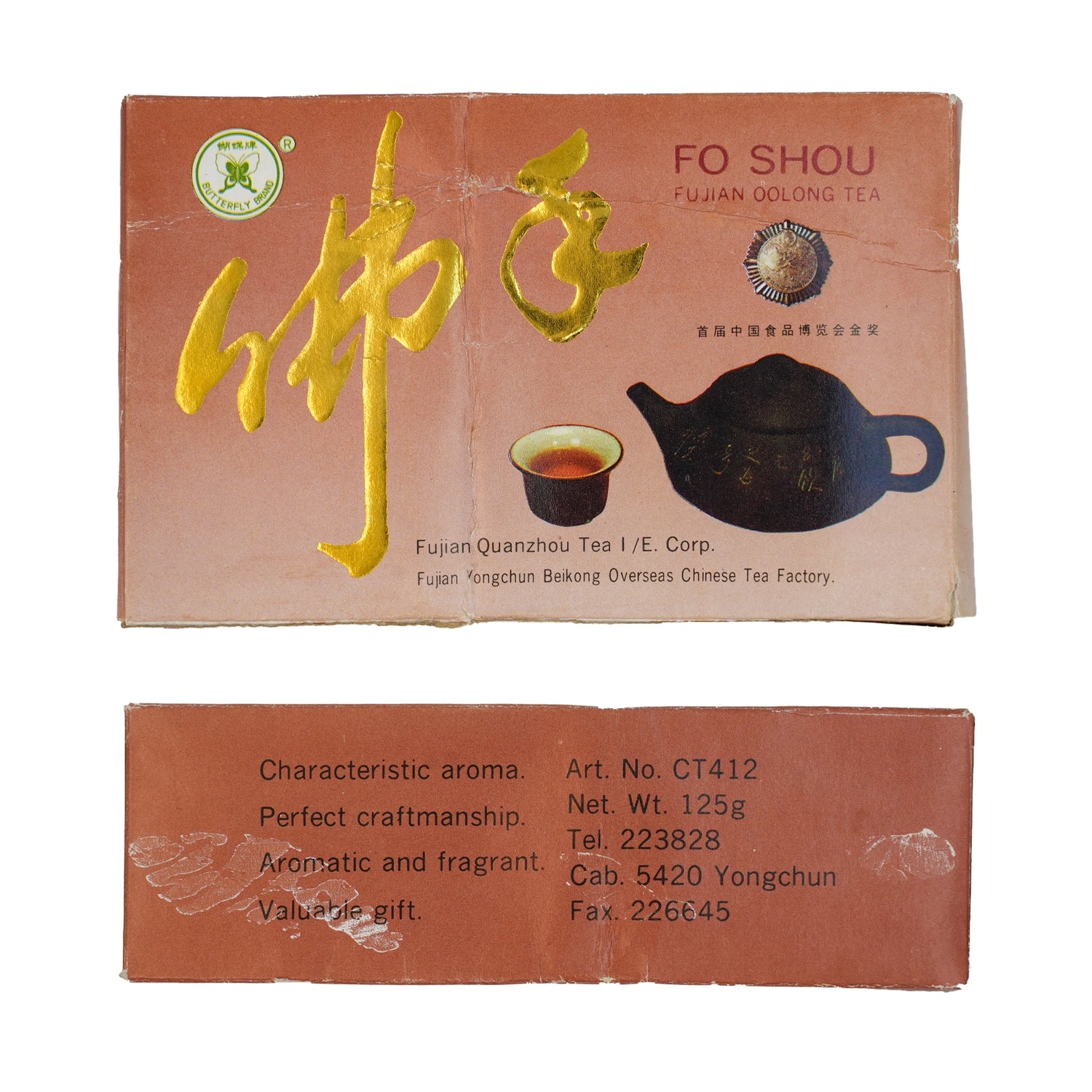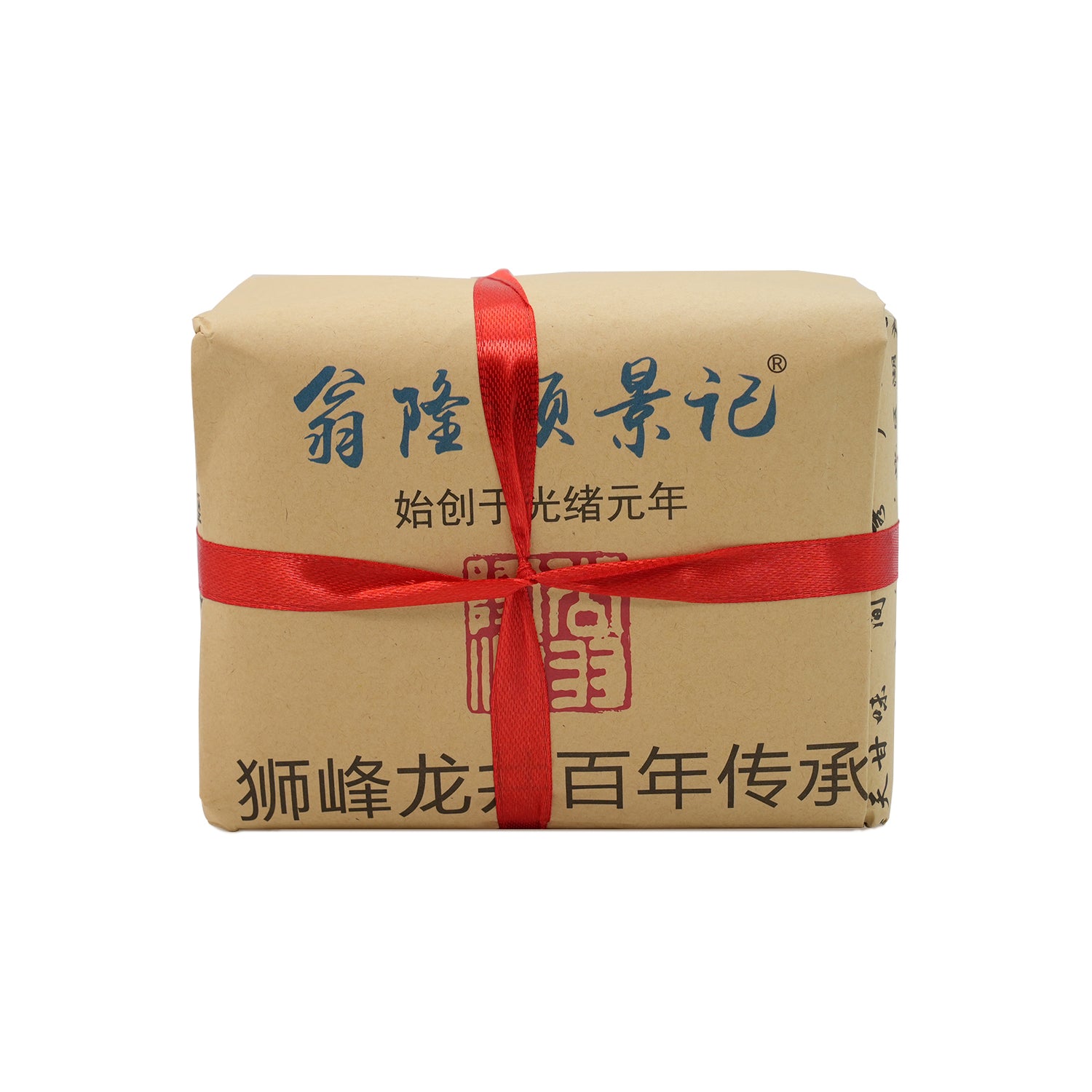Sort by:
121 products
121 products
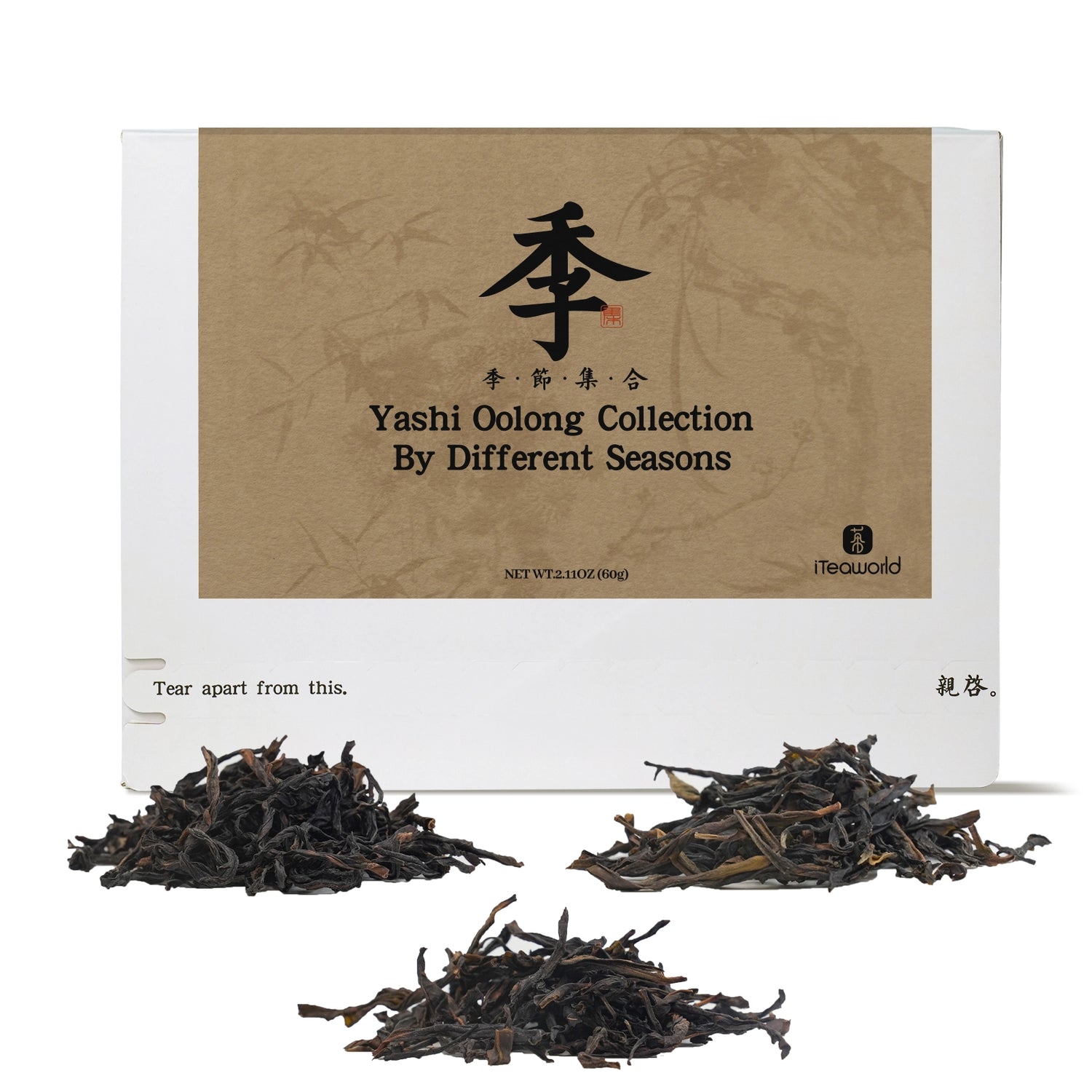

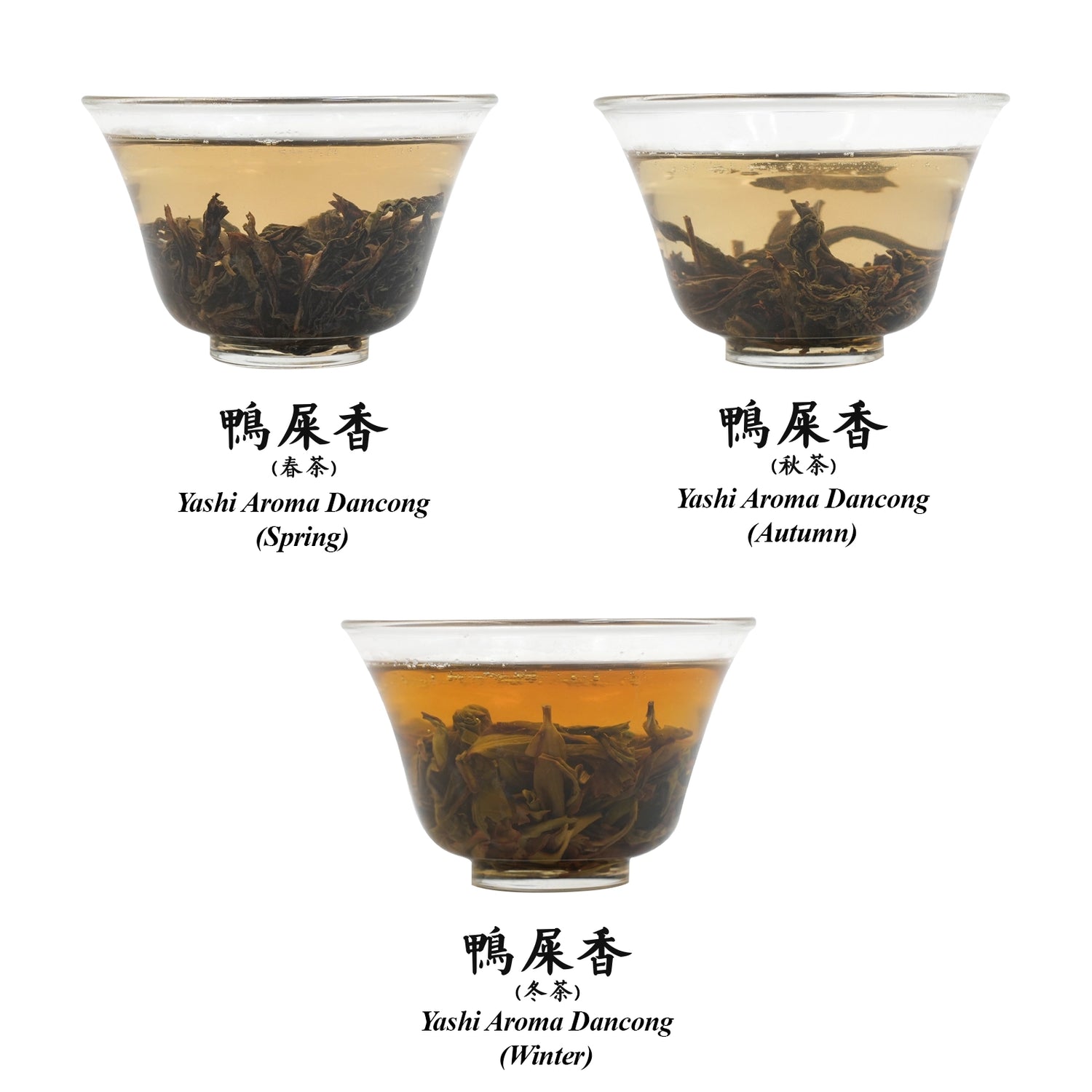
Ya Shi Xiang oolong Comparison Set – Spring, Autumn & Winter Varieties 60g
$19.99
Unit price perYa Shi Xiang oolong Comparison Set – Spring, Autumn & Winter Varieties 60g
$19.99
Unit price perSeasonality of Oolong Tea
Oolong tea can be harvested in all four seasons: spring, summer, autumn, and winter. However, Wuyi rock tea is only harvested in the spring. Oolong teas picked in the midday usually have the most pronounced aroma. Summer teas are mostly used in milk tea and are less common in loose leaf tea markets.
Spring teas tend to grow slower, resulting in higher levels of amino acids and tea polyphenols, with a lower ratio of phenols to amino acids. However, due to the frequent rainy weather in tea-growing areas like Fujian and Guangdong, spring teas may have less aromatic compounds than autumn or winter teas. Therefore, autumn and winter oolongs tend to have a stronger aroma. Winter oolongs, in particular, may even have a crisp, cold-like fragrance. Spring oolongs, on the other hand, tend to be richer in substances, offering a sweeter and fresher taste.
This product features three different seasonal Duck Shit Aroma teas from the same tea master in Hutou Village, Fenghuang Town. The oxidation and roasting levels are different for each, as oolong tea is all about adjusting to the leaves' conditions. Winter leaves are thinner, so oxidation and roasting are usually lighter. Try these three teas to see if you can notice the flavor differences between the seasons.
Products Included:
- Ya Shi Xiang (Duck Shit) Dan Cong Oolong(Spring) 20g
- Ya Shi Xiang (Duck Shit) Dan Cong Oolong(Autumn) 20g
- Ya Shi Xiang (Duck Shit) Dan Cong Oolong(Winter) 20g
Origin:
- Hutou Village, Fenghuang Town, Chaoan District, Chaozhou City, Guangdong Province, China
Master Blender:
- Lin Shupeng
Processing Time:
- November 20, 2024
Best Before Date:
- 36months
Tea Variety:
- Ya Shi Xiang (Duck Shit) Dan Cong variety
Altitude:
- 300-400 meters
Soil Type:
- yellow soil
Oxidation Level:
- Medium oxidation (40-50%)
Roasting Level:
- Spring: Two roasts, medium fire, around 100°C (212°F)
Autumn: Two roasts, medium fire, around 100°C (212°F)
Winter: One roast, light fire, around 80°C (176°F)Very light roast, 70-80°C (158-176°F)
Roasting Method (Charcoal or Electric):
- charcoal briquetting
Brewing Recommendations:
Chinese-Style Oolong Brewing
- Teaware: Gaiwan or clay teapot
- Water Temp: 212°F (100°C)
- Tea-to-Water Ratio: 1g per 0.7 oz (20ml)
- Steep Time: 15 sec (1-3 steeps), add 5-10 sec after
- Re-Steep: Up to 7 times
Western-Style Oolong Brewing
- Teaware: Teapot, infuser, or French press
- Water Temp: 212°F (100°C)
- Tea-to-Water Ratio: 1 tsp (2-3g) per 8 oz (240ml)
- Steep Time: 3-5 minutes
- Re-Steep: Up to 3 times, adding 1minutes each time
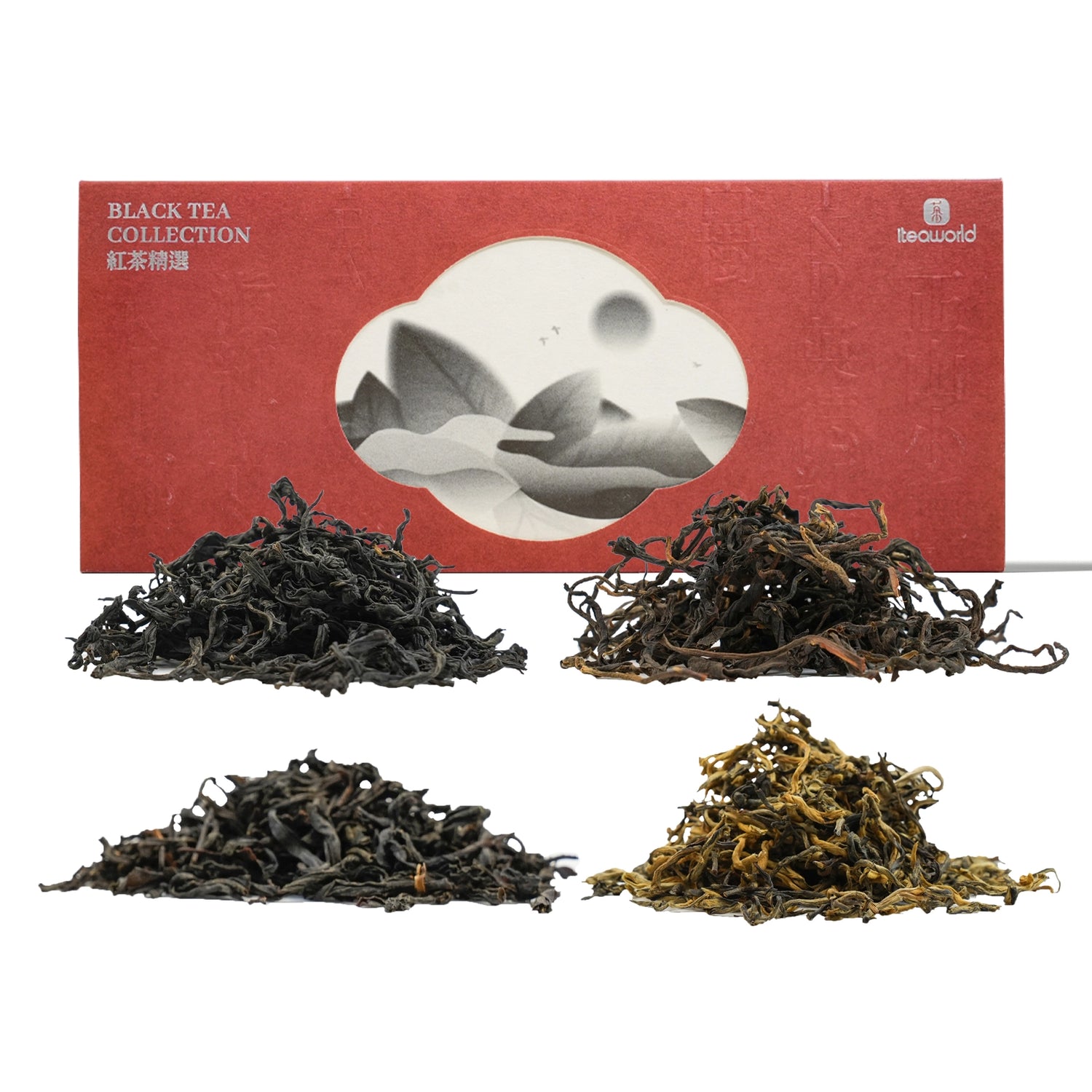


Chinese Black Tea Collection – 4 Premium Teas for Tea Enthusiasts & Gifting 100g
$39.99
Unit price perChinese Black Tea Collection – 4 Premium Teas for Tea Enthusiasts & Gifting 100g
$39.99
Unit price perDiscover Authentic Chinese Black Tea Collection
Chinese black tea has a 400-year heritage and remains deeply rooted in tradition. From the smoky pine notes of Tongmuguan’s classic Zhengshan Xiaozhong, to the refined, fruity aromas of Keemun prized by European royalty, to the full-bodied richness of Yunnan’s ancient-tree Gongfu black tea, each variety tells a unique story. What sets these teas apart is the dedication to traditional, hands-on methods: the leaves are handpicked, sun-wilted, and even slow-dried over charcoal or pinewood fires to preserve their natural shape and complexity. This commitment results in whole-leaf teas with a depth and character far beyond mass-produced, machine-processed black teas.
iTeaworld has curated this premium selection to showcase China’s finest and most diverse black teas, capturing varying fermentation levels and distinct terroir influences. Whether you’re a tea enthusiast looking to experience authentic Chinese flavors or seeking a unique gift, this collection offers a refined tasting journey through China’s rich tea-making legacy.
Note: Chinese high-quality black teas are best enjoyed on their own, without milk or sugar. If you prefer a stronger, milk-friendly tea, this may not be the ideal collection for you. But for those who appreciate nuanced, natural flavors, this set is an invitation to explore a truly exceptional tea experience.
Premium Chinese Black Tea Collection
Featuring the most authentic and popular black teas from China's top regions:
Wuyi Zhengshan Xiaozhong (Lapsang Souchong): 5 packs x 5g
Yunnan Golden Bud Black Tea: 5 packs x 5g
Keemun Black Tea: 5 packs x 5g
Yunnan Ancient Tree Black Tea: 5 packs x 5g
O U R T E A R E G I O N S
Lapsang Souchong (Pine-Smoked) : Tongmu Village, Xingcun Town, Wuyishan City, Fujian Province
Dianhong Golden Buds Black Tea: Fengshan Town, Fengqing County, Yunnan Province
Keemun Black Tea: Ruokeng Township, Qimen County, Anhui Province
Century-Old Tree Black Tea: Jingmai Mountain, Huimin Town, Lancang County, Yunnan Province
Recommended Purchase:
This 2024 Dianhong Golden Bud Black Tea is crafted under the supervision of Zhang Guo'an, a renowned master and inheritor of Dianhong's traditional techniques. Made from tender pre-Qingming buds of the Fengqing large-leaf tea tree variety, it showcases a rich honeyed aroma and a smooth, full-bodied taste. Perfect for tea lovers who prefer a premium, delicate black tea experience when enjoyed plain. However, if you’re looking for a tea to pair with milk or sugar, this might not be the best choice.
Product Details:
Origin: Dayaitian Tea Factory, Fengqing, Yunnan Province
Production Date: April 2024
Grade: Premium
Tea Cultivar: Fengqing Large-Leaf Variety
Craftsmanship: Supervised by Zhang Guo'an, a master and heritage keeper of Dianhong tea-making traditions
Flavor Profile: Honeyed aroma with smooth, full-bodied texture
Highlight: This Dianhong Golden Bud is crafted entirely from tender tea buds using traditional methods, offering a classic and authentic Dianhong flavor with an intense and aromatic character.
About Dianhong Golden Bud Black Tea:
Dianhong Golden Bud represents the pinnacle of Dianhong teas and is considered a premium Chinese black tea. First introduced in 1959, it is made from carefully selected pre-Qingming tea buds of the Yunnan large-leaf variety and processed using traditional techniques. The tea leaves are covered in golden tips, producing a bright, reddish-gold liquor with a long-lasting, high aroma and a fresh, sweet aftertaste. Compared to the Dianhong varieties made from one bud and two leaves, Golden Bud offers a sweeter and more delicate flavor profile, making it an excellent choice for those who enjoy refined and unblended black teas.
How to Brew
Water Temp: 203°F(or 95℃)
Tea-to-Water: 1g per 50ml
Steep Time: 20 sec for first 3 steeps, add 5 sec each time after
Teaware: White porcelain gaiwan
Re-Steep: 5-7 times
Why Choose This White Peony Tea?
If you love delicate floral aromas, smooth textures, and the unique charm of traditional Chinese white tea, this White Peony (Bai Mudan) from Fuding, China, is a perfect fit. Its light sweetness and refreshing aftertaste make it ideal for beginners and seasoned tea lovers alike. Expertly crafted by Master Li Shengyuan using traditional sun-drying techniques, this tea is perfect for sipping, gifting, or collecting.
Product Details:
Origin: Fuding, Fujian, China
Harvest Date: April 2024
Grade: Premium White Peony (Bai Mudan)
Tea Variety: Fuding Da Bai (Big White)
Craftsmanship: Masterfully crafted by Li Shengyuan, a senior tea artisan with over 10 years of experience
Flavor Profile: Delicate floral aroma, smooth texture, and a refreshing, slightly sweet finish
What Makes It Special: A traditional sun-dried white tea from China’s famous white tea region, handpicked and expertly crafted for quality and collectibility
How to brew:
Water Temp: 194–203°F (or 90-95℃)
Tea-to-Water: 1g per 25ml
Steep Time: 30 sec first steep, add 5 sec each time
Teaware: White porcelain gaiwan
Re-Steep: 5-7 times
About White Peony Tea:
White Peony, or Bai Mudan, is a premium Chinese white tea known for its elegant floral fragrance, light sweetness, and clean, refreshing taste. Made from tender tea buds and the first leaf, it strikes a perfect balance between flavor and smoothness, making it approachable for beginners and cherished by tea enthusiasts. Its name comes from its unique appearance: green leaves and silvery-white buds resemble blooming flowers. When steeped, the leaves cradle the buds, creating a visual like a flower in bloom. While it can be aged, its tender nature makes it best enjoyed fresh.
Storage Tips:
To preserve its quality, store White Peony tea in a cool, dry place following GB/T 30375 standards.
For short-term storage: Use kraft paper or aluminum bags, remove excess air, seal tightly, and place in a tin or small box.
For long-term storage: Use triple-layer packaging (cardboard box, aluminum bag, and plastic bag) in a controlled environment below 77°F (25°C) with humidity under 50%.
You may have tried various green teas, like Longjing, Zhucha, and Jasmine tea, but you're looking to explore more high-quality, reasonably priced Chinese teas. To ensure value, we've carefully selected premium teas from China's top ten famous varieties, following these key principles:
Collaborating with experienced tea masters to ensure traditional and skilled craftsmanship.
Choosing high-grade leaves—one bud and one or two leaves—while hand-picking out stems and dust to ensure purity.
Sourcing directly from tea farmers to maintain freshness and quality, cutting out the middleman.
Ensuring our selections are fresh spring teas from 2024 to capture vibrant flavors and aromas.
Picking high-quality leaves from authentic tea varietals to guarantee unique taste.
Balancing quality with affordability to meet consumer needs.
Sourcing from core production areas or nearby regions to ensure consistency in terroir.
Avoiding lower-grade flatland teas, focusing on those grown at altitudes above 600 meters to enhance flavor complexity.
Net weight: 90g, including:
Premium Biluochun: 15g
Premium Enshi Yulu: 15g
Premium Xinyang Maojian: 15g
Premium Lu'an Guapian: 15g
Premium Taiping Houkui: 15g
Premium Huangshan Maofeng: 15g
Here’s a brief overview of each tea:
Huangshan Maofeng: This tea is sourced from a renowned high mountain region, featuring tea trees over 60 years old grown in gravelly soil at 800 meters elevation. Recognized as a national intangible cultural heritage, Huangshan Maofeng boasts a distinctive aroma with floral and sweet notes, producing a clear, bright green-yellow tea that offers a pure high mountain experience.
Liu'an Guapian: This historic royal tribute tea was once reserved for the imperial family. Our premium Liu'an Guapian is hand-crafted by a master with decades of experience, sourced from high-altitude tea plants at 600 meters. The spring-harvested leaves ensure a rich fragrance and refreshing flavor, resulting in a pure, lingering aftertaste.
Taiping Houkui is a famous green tea from the Taiping area of Huangshan, Anhui Province, China. It comes from the core production region—Qiaoshan Village in Xinming Township—known for its cool, humid climate and fertile soil, perfect for growing tea. Our premium Taiping Houkui is made from one bud and three leaves, usually harvested around the Grain Rain season, with fine white fuzz on the leaves indicating top quality. The tea is grown from the traditional seed-propagated ‘Shi Da Shu’ variety, which matures later than usual. Due to the high altitude in Huangshan, the first harvest also takes place around Grain Rain. We work with Master Yu Jianguo, a tea farmer with over 20 years of experience, to produce this tea, which has a fresh flavor and aroma.
Biluochun: As one of the most iconic green teas in China, Biluochun is renowned for its unique floral and fruity aroma. Our premium Biluochun is sourced from Liyang, Jiangsu Province, crafted using traditional methods, and picked at the pre-rain period, ensuring a fresh, delicate flavor with minimal bitterness. This high-quality tea offers excellent value, priced at half to a third of similar products from core regions.
Xinyang Maojian: A top Chinese green tea, Xinyang Maojian comes from the core production area in Shihe District, Xinyang, located in high-altitude mountains at 900 meters. The significant temperature difference between day and night creates a unique elegant aroma and a fresh, flavorful taste. Our 2024 spring harvest features the highest quality leaves, with fine white hairs indicating superior quality.
Enshi Yulu: This historic steamed green tea is the only one in China that retains this traditional crafting method. Our Enshi Yulu comes from the core area in Enshi, Hubei, handpicked and crafted by a tea farmer with over 20 years of experience. Using high-grade leaves, this tea is fresh, rich, and slightly reminiscent of seaweed, while also being rich in natural selenium, known for its immune-boosting and antioxidant properties.
Tai Ping Hou Kui is a renowned Chinese green tea from the famous production area of Huangshan in Anhui Province. This tea comes from the core region of Tai Ping Hou Kui, specifically Qiaoshan Village in Xinming Township, where unique climatic conditions—cool, moist weather and fertile soil—create an ideal growing environment.
Our premium Tai Ping Hou Kui mainly consists of one bud and three leaves, carefully selected during the harvest, which typically occurs around the Grain Rain festival. Each leaf is covered in fine white down, showcasing its exceptional quality. We collaborate with Master Yu Jianguo, a tea farmer with over 20 years of experience in growing and crafting tea, ensuring expertise in creating this exquisite beverage.
This tea is made from the traditional seed-reproducing Shi Da Ye variety, known for its late-maturing characteristics. Coupled with the high altitude of the Huangshan region, the first harvest occurs around the Grain Rain period, resulting in a batch of Tai Ping Hou Kui that delivers vibrant flavors and aromas, captivating tea enthusiasts. Each sip captures the essence of its misty mountainous origins, offering a rich, smooth mouthfeel with a delightful sweetness.
Why Choose Tai Ping Hou Kui?
Authentic Craftsmanship & Core Origin: This Tai Ping Hou Kui comes from the heart of Huangshan City in Anhui Province, ensuring that every leaf captures the unique climate and fertile soil of the region. These natural conditions create an ideal environment for the tea trees to thrive, resulting in exceptional quality.
Direct Sourcing, Great Value: We collaborate directly with local tea farmers to ensure the authenticity and freshness of our tea. This direct sourcing approach not only guarantees high quality but also allows us to offer competitive prices, giving you premium tea without breaking the bank.
Early Spring Harvest: Our Tai Ping Hou Kui is harvested right around the Grain Rain season, making it one of the first teas of spring. This timing ensures that the leaves are picked while they’re bursting with vitality, preserving their delicate characteristics and rich flavors.
High-Quality Tea Varietals: We use the traditional Shi Da Ye tea tree variety, known for its late-maturing traits. Combined with Huangshan’s unique climate, this leads to remarkable quality, ensuring every sip is filled with pure, natural essence and aroma.
Why We Made This Tea:
Biluochun is one of China's most famous green teas, cherished by tea enthusiasts worldwide for its unique flavor and aroma. However, many people often feel confused when choosing Biluochun: Is a higher grade more suitable, or is a lower grade enough? To help you better understand this, we have introduced this set of nationally recognized Biluochun teaching samples.
Product Introduction:
This Biluochun grade series includes five grades: Special Grade One, Grade One, Special Grade Two, Grade Two, and Grade Three. Each tea has been certified by the China Tea Association and is a nationally recognized Biluochun grade teaching sample. By tasting Biluochun of different grades, you will be able to systematically understand their characteristics and flavor differences, thus finding the tea that best suits your taste and needs. In addition, this series of products comes from the Biluochun Tea Factory in West Mountain, Wuzhong District, Suzhou City. The tea leaves grow in an environment with distinct seasons and a suitable climate, ensuring their authenticity in origin, variety, and flavor, as well as high quality and unique natural floral and fruity aroma.
We hope that through this series, we can help tea friends who wish to delve into Biluochun to provide a comprehensive tasting experience. It's not just a taste enjoyment, but also an in-depth exploration of Chinese tea culture.
Reasons to Recommend This Tea:
This series is designated by the China Tea Science Society as a teaching sample.
It is the most authentic Biluochun, coming from the core area of Biluochun in West Mountain, Taihu Lake, Suzhou City, Jiangsu, which is the core origin of the authentic Dongting Biluochun, surrounded by Taihu Lake on all sides.
Excellent natural environment: Taihu Lake surrounds West Mountain, where both tea and fruit are grown. The island is planted with loquat trees, plum blossom trees, and plum trees, giving the tea a unique natural flavor all year round. Geese are raised on the island, forming natural fertilizer.
The most authentic Biluochun tea plant varieties are used, which are local to Dongting Mountain, including "Jiang Ban Tou," "Liu Ye Tiao," and "Chu Ye Zhong."
Each tea goes through a strict selection and production process, including hand-picking and hand-firing, making it a pure handcrafted tea.
Suitable for:
Those who like Biluochun and want to experience the authentic flavor.
Those who want to delve into the flavor differences of different grades of Biluochun.
Those who want to systematically understand the Chinese green tea system.
Not suitable for:
Those who don't care much about subtle flavor differences.
Those who don't like the elegant and delicate flavor of green tea.
Groups sensitive to tea prices.
Wild Cliff Tea Herbal Tea: Also known as Shiya Tea, it’s a caffeine-free green tea from the high-altitude forests of Guangxi, China. Named for its unique growing environment—cliffs and steep slopes—this tea has a long history and was once a valuable tribute. It has a tight, heavy appearance, dark green color, and rich aroma. When brewed, it produces a bright green liquor with a fresh and sweet taste. Shiyan Tea is high in flavonoids, polyphenols, and amino acids, offering anti-inflammatory, detoxifying, and blood pressure-lowering benefits. It’s caffeine-free, making it suitable for those concerned about sleep.
Ya Shi Xiang Dancong | 鸭屎香单丛乌龙茶
Despite its curious name, Ya Shi Xiang (Duck Shit Aroma) is one of the most beloved and accessible styles of Dancong Oolong. Grown in Wudong Mountain and harvested in April 2025, this tea is made from the original Ya Shi Xiang cultivar—famed for its lush floral aroma and golden nectar-like sweetness.
This batch comes from Fengxi Reservoir Village in Fenghuang Town, Chao'an District, Chaozhou, Guangdong. Situated at an elevation of 500–600 meters, the area is recognized as one of the premium zones for Zhongshan Dancong tea. Just above lies the mid-high mountain belt, but teas from this elevation are already regarded as top-tier among commercial-grade Dancongs, offering exceptional quality at outstanding value.
Crafted with a light roast to preserve its signature perfume, it offers a silky-smooth texture, vibrant floral notes, and a lingering sweet finish.
Origin: Fengxi Reservoir, Phoenix Town, Chaozhou, Guangdong
Tea Maker: Liu Chengpeng, a second-generation tea artisan with over 20 years of tea-making experience in a family that has crafted Dancong tea for generations.
Cultivar: Ya Shi Xiang (Duck Shit Aroma)
Harvest: April 2025 (Spring)
Elevation: 500-600m
Oxidation: Medium (40–50%)
Roast: Light (traditional charcoal finishing)
Shelf Life: 3 years
Storage: Store in an airtight container in a cool, dry, and odor-free place. For light-roasted Dancong, refrigeration is recommended to preserve its floral aroma.
Flavor
Aroma: Intensely floral—gardenia, magnolia, and honey
Taste: Lush, nectar-like sweetness with smooth body and soft mineral notes
Aftertaste: Long-lasting, floral-sweet with cooling effect in the throat
Brewing
Vessel: Porcelain gaiwan / Chaozhou clay pot
Water: 95°C | 203°F
Gaiwan Method:
5-7g per 100ml,1nd–3th: 8–12s | 4th+: add 5–8s per steep|Up to 9 infusions
Cold Brew Instructions:
Use 3–5g of tea with 500ml (about 17 oz) of water.
Water tip: Spring water or purified soft water is best.
Seal in a container and place in the refrigerator (39–46°F / 4–8°C).
Let it steep for 6–8 hours (ideal to brew before bed and enjoy in the morning).
Note: Too short a steep may result in weak aroma; over 10 hours may cause slight bitterness.
Occasions
Perfect for introducing friends to Dancong oolong
Uplifting afternoon companion with sweet, floral lift
A crowd-pleaser—great for casual or focused tasting
The Northern Fujian region is considered the birthplace of Oolong tea, and the traditional crafting methods of Wuyi Rock Tea have been recognized as part of China’s intangible cultural heritage. This collection brings together iconic oolong varieties from the Song Dynasty (Wuyi Qizhong and Jian'ou Dwarf Oolong) to today (Blended Da Hong Pao, Wuyi Rougui, Aged Tree Shuixian Oolong ), along with emerging cultivars with great future potential (Rui Xiang Oolong). Each tea carries the unique craftsmanship of the region, with its own distinct story and flavor. We hope this collection will allow you to explore the diverse flavors and rich cultural heritage of Northern Fujian (Minnan) Oolong tea.
Product Contains:
Wuyi Qizhong*3 bags* 5g
Jian'ou Dwarf Oolong*3 bags* 5g
Blended Da Hong Pao*4 bags* 5g
Wuyi Rougui *4 bags* 5g
Aged Tree Shuixian Oolong*3 bags* 5g
Rui Xiang Oolong*3 bags* 5g
Processing Time: November 2024
Best Before Date: 36 months
Minnan North Oolong Tea: A Cup, A History, A Story
1. Origins (Tang and Song Dynasties)
- The people used Wuyi Caicha (Qi zhong ) to produce Beiyuan tribute tea (a type of steamed green tea). During transportation, the leaves collided, causing some to turn red and undergo partial oxidation, developing semi-fermented characteristics, which are considered the origins of Oolong tea.
2. Birth (Ming Dynasty)
- After Emperor Zhu Yuanzhang banned compressed tea cakes, the tea farmers of Wuyi Mountain combined green and black tea processing techniques to create semi-fermented Oolong tea.
3. Development (Qing Dynasty)
- Wuyi Cai Tea (Qi Zhong): By the Qing Dynasty, Wuyi Rock Tea had established the basic processes of sun-drying, shaking, and roasting. The Wuyi Rock Tea system had matured, with the earliest representative varieties being Wuyi Cai Tea (Qi Zhong) and its derivative four famous cultivars (Da Hong Pao, Bai Ji Guan, Tie Luo Han, Shui Jin Gui).
- Jian'ou Dwarf Oolong: Originally from the Dongfeng Town of Jian'ou, the Dwarf Oolong (also known as Xiao Ye Oolong) was introduced to Wuyi Mountain, where it was improved through craftsmanship, including charcoal roasting, imparting it with signature peachy aroma and strong mineral finish made it a favorite for blending, earning the nickname “Prime Minister of Tea”.
- Wuyi Rougui: Rou Gui, another celebrated rock tea, dates back to the Qing dynasty. It was once rare and scattered in the rocky core of Wuyi, but it expanded in the 1960s through cutting and propagation.
- Wuyi Shui Xian: Shui Xian, introduced from Jianyang in the 1800s, became a Fujian classic thanks to its rich, woody flavor and thick body.
4. Prosperity (20th Century to Present)
- Blended Da Hong Pao: In the 20th century, breakthroughs in asexual reproduction techniques allowed the successful propagation of Da Hong Pao by cutting in 1982, leading to the mass production of pure Da Hong Pao after the mother tree ceased harvesting in 2006.
- Rui Xiang: New hybrid varieties such as Jin Mudan, Huang Guanyin, and Rui Xiang were developed by crossbreeding traditional types like Rou Gui, Shui Xian, and Huang Jin Gui. Rui Xiang, in particular, is known for its ever-changing aroma—from frankincense and gardenia to osmanthus, peach, and honey—earning it the nickname “The Shape-Shifter” of rock teas.
Unique Crafting Characteristics:
1. Heavy Fermentation & Oxidation
Northern Fujian oolong follows a unique processing style: longer withering under sunlight, light but repeated shaking, multiple oxidation cycles, and deep fermentation. Compared to Southern Fujian oolongs (which are 10%-30% oxidized), Northern Fujian oolongs range from 25-55% oxidation, giving the tea a rich amber-gold color and a smoother, more full-bodied taste.
2. Charcoal Roasting Process
Charcoal roasting is a signature technique of Northern Fujian Oolong teas. It involves three key stages:
Initial Roast ("Water Walk"): High heat (~150°C) is used to quickly remove surface moisture and grassy notes.
Second Roast (Slow Roast): A gentle, extended roast lasting 10-18 hours, with the temperature gradually lowered to ~80°C. This stage develops rich caramel and mineral notes.
Final Roast (Aging Roast): A very low, slow roast at 60–80°C for 12-24 hours. This step reduces the leaf’s moisture to 3–5%, boosting shelf life and aging potential.
Only dense hardwood charcoal—like longan or lychee wood—is used to ensure a steady, even roast.
This traditional method produces a warm, rounded flavor with a deep roasted aroma, offering a smoother and more refined character than the sharper taste of electric-roasted teas.
3. Rolling & Shaping
No Ball-Rolling – Unlike Southern Fujian oolongs, Northern Fujian oolongs are not tightly rolled, preserving their long, twisted leaf shape with a glossy dark hue and reddish-brown highlights.
Double Frying & Rolling – The tea is fried and rolled twice, ensuring an even release of its inner essence and creating a thicker, silkier tea liquor.
Brewing Recommendations:
Teaware:
Gaiwan (110- 150ml): Best for aromatic teas (Rougui, Dangui).
Yixing Clay Teapot: Ideal for heavily roasted or aged teas.
Water:
Use 100°C (boiling) spring or purified water.
Tea-to-Water Ratio:
5g tea / 110ml water.
Brewing Tips:
Preheat & awaken tea.
High pour for aroma, low pour for smoothness.
Quick steeps (5-10s) for first 3 infusions, then extend.
Fully drain after each brew.
Recommended Purchase
This Organic Silver Junmei, produced in 2007 and aged for 18 years in a sealed dry northern warehouse, is crafted from local group varietals harvested in Tongmu Village, a primary tea-growing area in Wuyi Mountain. It is produced by Wuyishan Ruiyan High Mountain Tea Co., Ltd. The tea is made from carefully selected tender buds using the traditional handmade techniques of Lapsang Souchong, ensuring the tea leaves remain intact and well-preserved. This tea is no longer available on the market.
The tea offers a long-lasting floral aroma, a rich, refreshing flavor, and a high sweetness. While it is in a transitional aging phase and may have a slightly tangy note, it remains an excellent choice for drinking and a treasured item for collectors.
Key Details about Organic Silver Junmei black tea
- Origin:Mount Wuyi, Fujian, China
- Production Date:2007
- Grade: special grade
- Tea Cultivar:Tongmu Village Local Group Varietals
- Craftsmanship:Silver Junmei is meticulously crafted using one bud and one leaf, following the traditional handmade techniques of Lapsang Souchong. The process includes picking, withering, rolling, fermenting, and drying, with a strong emphasis on precision and care. The tea is then naturally aged in a dry storage environment for 18 years, allowing it to develop its unique character and depth.
- Flavor Highlights:The tea offers a long-lasting floral aroma, a rich, refreshing flavor, and a high sweetness, though it may have a slight tanginess due to its transitional aging phase.
What is Silver Junmei black tea ?
Silver Junmei, born in 2005, is a premium-grade masterpiece among Lapsang Souchong black teas, often referred to alongside Golden Junmei as the "Twin Jewels of Black Tea." Sourced from wild tea trees growing at 1500-1800 meters above sea level in Wuyi Mountain, it is made exclusively from one bud and one leaf plucked before Grain Rain (Guyu). It takes 50,000 tender buds to produce just one pound of tea, making the raw material as rare as gold.
Crafted using traditional handmade techniques without smoking or sifting, the tea leaves are tight, slender, and eyebrow-shaped, with a silvery-gray hue and subtle golden tips. The aroma is elegant and refined, with notes of flowers and fruits. When brewed, the liquor is golden and translucent, offering a fresh, mellow, and sweet flavor with a harmonious blend of honeyed sweetness and longan aroma. The brewed leaves are even and coppery, and the tea remains flavorful even after ten infusions.
Due to its demanding production process and limited yield, Silver Junmei embodies both the wild essence of nature and the precision of masterful craftsmanship.
Brewing and Enjoyment Tips
This tea embodies the unique transformation brought by time. For the first rinse, use boiling water to quickly wash the tea leaves for no more than 5 seconds, then discard the water. This step helps awaken the tea and remove any storage-related odors. For the best experience, it is recommended to use traditional brewing methods to fully release its aged characteristics.
Recommended Brewing Methods
Gaiwan Brewing :
- Capacity:110ml Gaiwan
- Water:Mineral Water or Purified Water
- Water Temperature:95-100℃
- Brewing Times:8-10 times
- Tea Water Ratio:Around 1:22(Adjust according to your own taste)
- Brewing Time Once:For the first three infusions, steep the tea for 5-10 seconds and pour out immediately. For each subsequent infusion, increase the steeping time by 5 seconds.
Storage Guidelines
To ensure the best quality of tea, the ideal way to store it is in vacuum-sealed packaging, kept in a cool, dark, and dry place. Avoid exposure to strong odors and air. For sealed storage, using a tin can or a double-lidded metal can is recommended. For even better results, you can store the sealed tea in the refrigerator or a dry storage container.
Weight & Packaging:
Weight : 100g (3.5oz)
Packing Type : Original canned seal
- Four types of packaging are randomly dispatched.
- During the aging and transportation process of aged tea, the packaging and the tea itself may get damaged. Please be cautious when purchasing if you mind this.
Recommended Purchase
This aged Jasmine Tea is a rare and exquisite tea that has been naturally stored for over 30 years, making it a true collector’s item. Crafted by the renowned Fuqing Dongge Overseas Chinese Tea Factory in the early 1990s, this tea has undergone decades of natural aging, enhancing its depth of flavor and smoothness. Unlike freshly scented jasmine tea, this aged version offers a more mellow and rich taste with a deep, lingering floral fragrance. It has completely transformed over time, developing a soothing and slightly honeyed undertone while retaining its signature jasmine aroma. This tea is no longer in circulation on the market, making it a unique find for tea connoisseurs and collectors.
Key Details about Jasmine Tea
- Origin: Fuqing, Fujian, China
- Production Date: Early 1990s
- Grade: Third Grade
- Tea Cultivar: Green tea buds
- Craftsmanship: Aged naturally over decades, originally scented with jasmine flowers
- Flavor Highlights: Aged floral aroma, mellow and smooth taste, slightly honeyed aftertaste
- Storage: Stored in a dry, cool environment in the northwest warehouse
What is Aged Jasmine Tea?
Aged Jasmine Tea is a unique category of jasmine tea that has been carefully stored for decades, allowing its flavors to develop and mature over time. While fresh jasmine tea is prized for its bright floral notes, aged jasmine tea offers a deeper, smoother taste with a richer texture. The aging process enhances the tea’s complexity, reducing any bitterness and infusing it with subtle honeyed sweetness. This type of tea is rare due to its long storage period and the fact that it is no longer in active production, making it highly sought after by tea collectors and enthusiasts.
Recommended Brewing Methods
-
Gaiwan Brewing
- 100ml Gaiwan
- 95℃-100℃
- 4-6 times
- 1:15 to 1:20
- 15-20 seconds
-
Thermos Brewing
- 1g tea per 100ml (3.4oz) water
- Use water at 95℃
- Steeping Time: 1-2 hours
- Tool: Insulated thermos
Storage Guidelines
Store in a cool, dry place, away from light, moisture, and strong odors. Proper storage will help preserve the delicate fragrance and flavor of the jasmine tea.
Weight & Packaging
- Net Weight: 50g (1.76oz)
- Packing Type: Original paper box sealed packaging
About Fuqing Dongge Overseas Chinese Tea Factory
The Fuqing Dongge Overseas Chinese Tea Factory, established in 1963, is a renowned producer of high-quality teas, specializing in jasmine-scented teas. Located in Fuqing, Fujian, an area rich in tea cultivation, the factory has been dedicated to preserving traditional tea-making methods while ensuring the highest standards of craftsmanship. With decades of experience, Fuqing Dongge has become a trusted name in the tea industry, especially known for its aromatic jasmine tea, which has gained popularity both domestically and internationally. The aged Jasmine Tea from this factory is a testament to their commitment to excellence and the beauty of time-enhanced tea.
During the aging and transportation process of aged tea, the packaging and the tea itself may get damaged. Please be cautious when purchasing if you mind this.
Recommended Purchase
This 2007 Wa Mountain Impression "7751" Raw Pu-erh Tea Brick is supervised by Ms. Tan Mei, a former senior engineer and quality inspection section chief of the Kunming Tea Factory. Following traditional recipes, it selects high-quality sun-dried green materials from tall arbor trees in the Lancang River basin of Yunnan and is meticulously processed and pressed using the original Kunming Tea Factory's brick-making techniques. The tea inherits the essence of the Kunming Tea Factory's brick tea, with a uniform and neat brick shape, clear and even strips, exposed buds and hairs, bright orange-yellow soup color, fresh and high aroma, mellow and refreshing taste, and obvious returning sweetness and salivation. It is an excellent choice for daily drinking and collection.
Key Details about 2007 Wa Mountain Impression Tea Brick
- Origin: Cangyuan Wa Mountain Tea Factory, Yunnan Province, China
- Production Date: 2007
- Grade: Second Grade
- Tea Cultivar: Yunnan Large-Leaf Tea
- Craftsmanship: Traditional Kunming Tea Factory brick-making technique, sun-dried green tea, pressed into bricks
- Flavor Highlights: Bright orange-yellow soup color, fresh and high aroma, mellow and refreshing taste, obvious returning sweetness and salivation, rich, authentic flavor, reminiscent of the taste of aged raw tea from around 1995.
- Storage: Naturally stored in Dongguan with slight dryness, no off-flavors
What is Wa Mountain Impression Tea Brick?
Wa Mountain Impression Tea Brick is a Pu-erh tea product produced by Yunnan Cangyuan Wa Mountain Tea Factory. The tea factory owns over 6,000 acres of pollution-free high mountain ecological tea gardens, with the main tea garden base located in Tuanjie Dazhai, Yanshuai Town, Cangyuan County, at an altitude of over 1,800 meters. The climate is mild, rainfall is abundant, and the area is shrouded in clouds and mist, far from pollution, making it an ideal place for tea cultivation. The tea factory strictly manages the tea gardens according to international organic agriculture movement federation (IFOAM) technical specifications, ensuring the excellent quality of Wa Mountain Impression tea sources.
Recommended Brewing Methods
-
Gaiwan Brewing
- Tea-to-water ratio: 1:20
- Water temperature: 95°C-100°C
- Infusions: 6-8 times
- Steeping time: 10-20 seconds
-
Thermos Brewing
- Tea-to-water ratio: 1g per 100ml water
- Water temperature: 100°C (boiling water)
- Steeping time: 1-2 hours
- Tool: Insulated thermos
-
Boiling Method
- Tea-to-water ratio: 1g per 100ml water
- Boiling time: 1-2 minutes, then let sit for 2-3 minutes
- Rebrew: Extend boiling time by 3 minutes for each additional infusion
- Best with: Ceramic or glass teapot
- Steeping times: 3-4 brews
Storage Guidelines
To maintain the tea's optimal aging process, store it in a dry and cool environment with humidity below 45% and temperature under 25°C. Keep it away from strong odors, direct light, and air exposure. Proper storage ensures that the tea retains its aged aroma and continues to mature gracefully over time.
Weight & Packaging
- Net Weight: 250g (8.8oz)
- Packaging: Original paper box packaging
During the aging and transportation process of aged tea, the packaging and the tea itself may get damaged. Please be cautious when purchasing if you mind this.
Recommended Purchase
This Yongchun Fo Shou Oolong tea, produced in 1993 and naturally aged in dry storage for 33 years, is made from the Yongchun Fo Shou variety, a well-known tea type from Yongchun, Fujian Province. It was crafted by the Yongchun Beikong Overseas Chinese Tea Factory, established in 1917. This tea is handcrafted with traditional full-heat roasting and comes in its original packaging. No longer available on the market, it features a unique "aged aroma", rich sweetness and smooth texture, making it a cherished choice for lovers of aged Oolong tea.
Key Details about 1993 Yongchun Fo Shou
- Origin: Yongchun, Fujian Province, China
- Production Date : 1993
- Grade: Special Grade
- Tea Cultivar: Yongchun Fo Shou
- Craftsmanship : Traditional high-fire roasting with medium fermentation, followed by 33 years of natural dry storage in sealed outer box with an inner foil bag.
- Flavor Highlights: Warm "aged aroma" with notes of roasted nuts, complex layers of aged flavors.
What is Yongchun Fo Shou Oolong Tea?
Yongchun Fo Shou, also known as "Buddha’s Hand," is a premium variety of oolong tea grown in Yongchun, Fujian. Named after its leaves that resemble a Buddha’s hand, Yongchun Fo Shou is celebrated for its fragrant aroma, smooth taste, and exceptional aging potential. The tea is lightly twisted into a "dragonfly head" shape, with dark blackish-brown leaves indicative of traditional craftsmanship.
Brewing and Enjoyment Tips
This tea is a testament to the transformative effects of time, offering a rich, smooth, and slightly tangy flavor profile. Best enjoyed with long steeping times or simmering to fully release its aged characteristics.
Recommended Brewing Methods:
-
Gaiwan Brewing:
- 100ml Gaiwan
- 95℃-100℃
- 5-7 times
- 1:15 to 1:25
- 10~20 seconds
-
Thermos Brewing:
- 1g tea per 100ml (3.4oz) water.
- Use boiling water (212°F).
- Steeping Time: 1-2 hours.
- Tool: Insulated thermos.
-
Boiling Method:
- Add 1g tea per 100ml (3.4oz) water.
- Boil for 1-2 minutes, then let sit for 2-3 minutes.
- Rebrew by boiling 3 minutes longer with each steeping.
- Use a ceramic or glass teapot for optimal flavor.
- Enjoy up to 3-4 brews.
Storage Guidelines
Store this tea in a dry, cool environment with a humidity level below 45% and temperature below 25°C (77°F). Keep it away from strong odors, light, and air exposure. Proper storage ensures the tea retains its flavor and continues to age gracefully over time.
Weight
- 4.4oz (125g)
- Packing Type : Sealed Paper Box with Internal Foil Bag
About Yongchun Beikeng Overseas Chinese Tea Factory
Founded in 1917, the Yongchun Beikeng Tea Factory has a rich history of producing high-quality teas. Once a bustling hub of innovation and craftsmanship, the factory was home to over 1,000 tea workers at its peak, producing millions of pounds of tea annually. Its products, including Yongchun Fo Shou, were highly sought after in Hong Kong, Taiwan, Japan, and Southeast Asia.
Just as many state-owned old factories have experienced ups and downs, in the 1990s, the tea factory once fell into a slump, and the once bustling factory area gradually became desolate. The former factory director, Huang Shenghou, who had created its greatest glory and witnessed its decline, was deeply saddened by its decline and took over the factory himself after privatization.
Today, this aged Yongchun Fo Shou tea stands as a flavorful tribute to the factory's storied past and the enduring legacy of traditional Chinese tea-making.
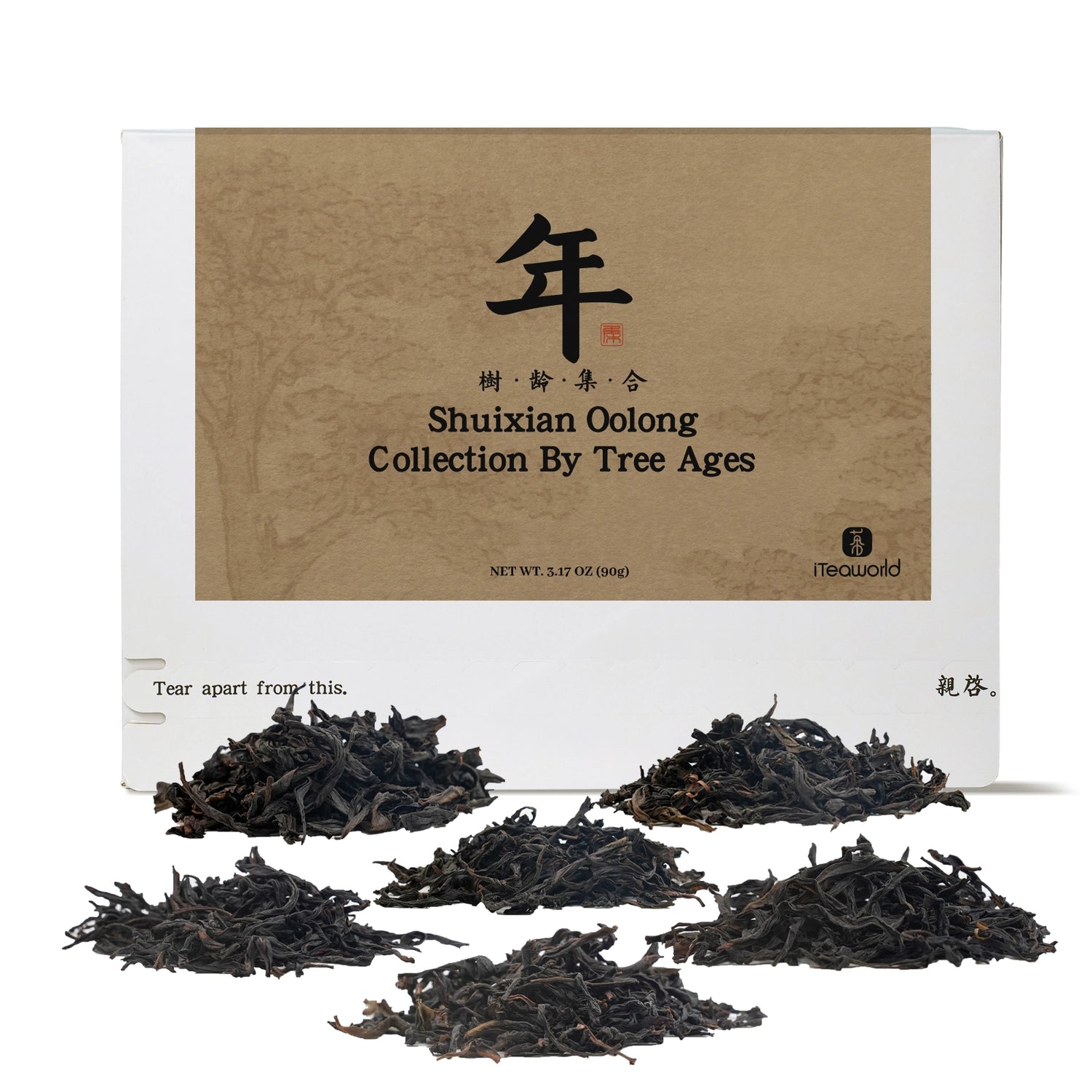
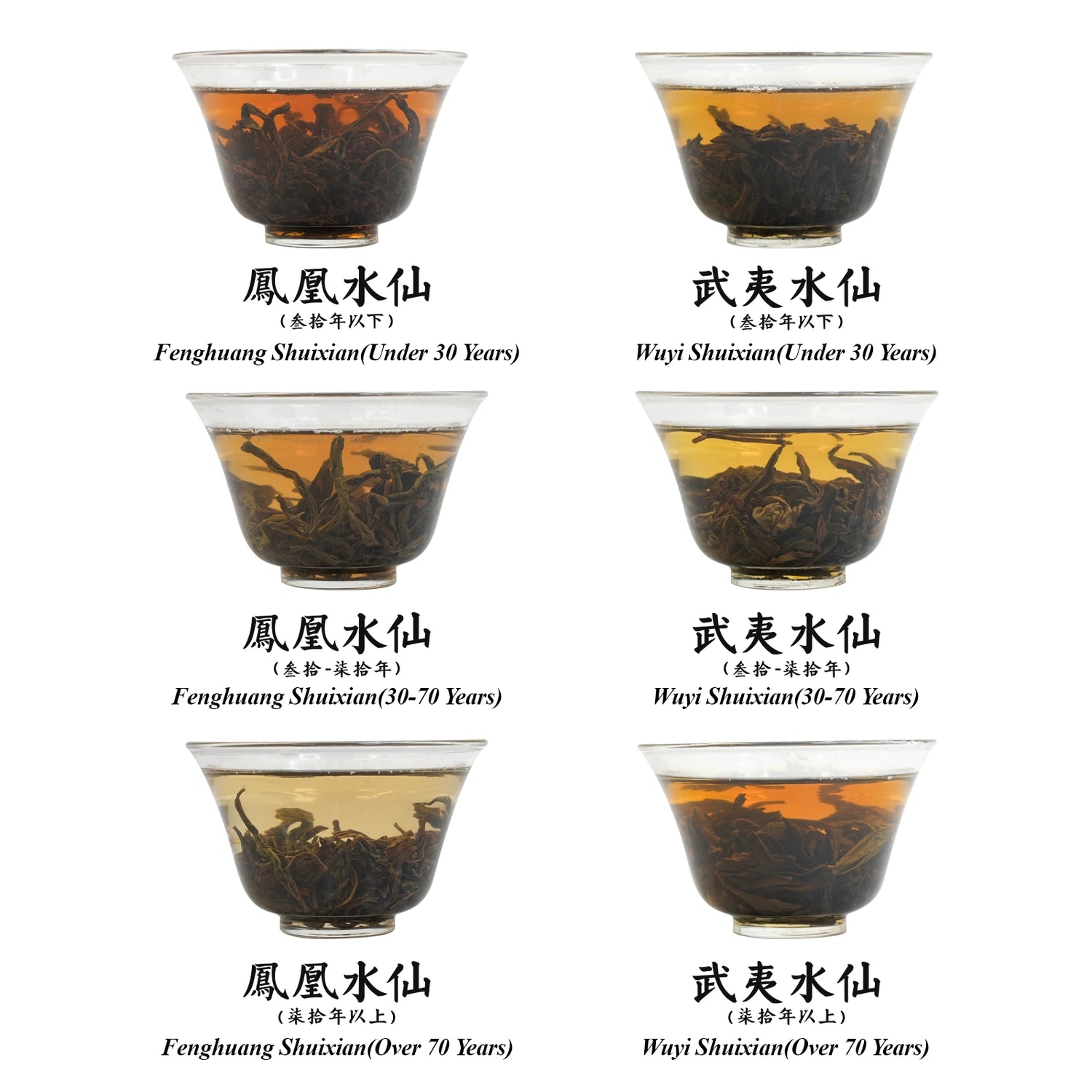
Chinese Oolong Tea Comparison Set: 6 Tree-Aged Blends (Fenghuang & Wuyi Shui Xian)90g
$49.99
Unit price perChinese Oolong Tea Comparison Set: 6 Tree-Aged Blends (Fenghuang & Wuyi Shui Xian)90g
$49.99
Unit price perMaybe You’re Not a Fan of Aged Tea Trees
In both Pu-erh and oolong tea, the age of the tea tree matters. Generally, older trees are rarer, which drives up their price. The age of the trees is most significant in certain oolong varieties, like Shui Xian (including Phoenix Shui Xian, Wuyi Shui Xian, and Minbei Shui Xian).
Typically, younger tea trees contain higher levels of amino acids but lower levels of tea polyphenols and minerals. This results in teas that are sweeter and fresher, but with a lighter, less complex flavor. These teas tend to have more floral notes and are best suited for light fermentation and roasting processes.
On the other hand, older tea trees tend to have higher levels of tea polyphenols, fiber, sugars, and minerals. They’re not as restricted by processing techniques, and the resulting teas are often richer, with more prominent sweetness, a longer-lasting aftertaste, and better endurance for multiple infusions.
This product features Phoenix Shui Xian and Wuyi Shui Xian from the same origin, made with similar processes but from different-aged trees. It’s a great way to compare how tree age influences the flavor of oolong tea.
Products Included:
- Fenghuang Shuixian(Under 30 Years)
- Fenghuang Shuixian(30-70 Years)
- Fenghuang Shuixian(Over 70 Years)
- Wuyi Shuixian (Under 30 Years)
- Wuyi Shuixian (30-70 Years)
- Wuyi Shuixian (Over 70 Years)
Origin:
- Fenghuang Shuixian(Under 30 Years):Shenming Village, Fenghuang Town, Chaoan District, Chaozhou City, Guangdong Province, China
- Fenghuang Shuixian(30-70 Years):Daping Village, Fenghuang Town, Chaoan District, Chaozhou City, Guangdong Province, China
- Fenghuang Shuixian(Over 70 Years):Gezaiwei, Wudong Village, Fenghuang Town, Chaoan District, Chaozhou City, Guangdong Province, China.
- Wuyi Shuixian (Under 30 Years):Jingshui Village, Xingcun Town, Wuyishan City, Fujian Province, China
- Wuyi Shuixian (30-70 Years):Daan Village, Yangzhuang Township, Wuyishan City, Fujian Province
- Wuyi Shuixian (Over 70 Years):Tianxin Village, Wuyi Township, Wuyishan City, Fujian Province
Master Blender:
- Fenghuang Shuixian:Lin Jizhong,林纪中
- Wuyi Shuixian:Chen hui,陈辉
Processing Time:
- Fenghuang Shuixian:Early May 2023
- Wuyi Shuixian:May 2024
Best Before Date:
- 36months
Tea Variety:
- Fenghuang Shuixian variety
- Wuyi Shuixiann variety
Altitude:
- Fenghuang Shuixian(Under 30 Years):760 meters
- Fenghuang Shuixian(30-70 Years):800-90 meters
- Fenghuang Shuixian(Over 70 Years):1150 meters
- Wuyi Shuixian (Under 30 Years):400 meters
- Wuyi Shuixian (30-70 Years):800-900 meters
- Wuyi Shuixian (Over 70 Years):500 meters
Soil Type:
- Fenghuang Shuixian:yellow soil
- Wuyi Shuixian:gravelly soil
Oxidation Level:
- Medium oxidation (40-50%)
Roasting Level:
- Under 30 Years (Option 1): Three roasts, medium-heavy fire (110-115°C / 230-239°F)
- 30-70 Years (Option 1): Three roasts, medium-heavy fire (110-115°C / 230-239°F)
- Over 70 Years (Option 1): Three roasts, medium fire (110-115°C / 230-239°F)
- Under 30 Years (Option 2): Two roasts, heavy fire (110-115°C / 230-239°F)
- 30-70 Years (Option 2): Three roasts, light fire (95-105°C / 203-221°F)
- Over 70 Years (Option 2): Light fire, 95-105°C (203-221°F)
- (Light Fire ~ 80°C, Medium Fire ~ 100°C, Heavy Fire ~ 120°C)
Roasting Method (Charcoal or Electric):
- charcoal briquetting
Brewing Recommendations:
Chinese-Style Oolong Brewing
Teaware: Gaiwan or clay teapot
Water Temp: 212°F (100°C)
Tea-to-Water Ratio: 1g per 0.7 oz (20ml)
Steep Time: 10-15 sec (1-3 steeps), add 5-10 sec after
Re-Steep: Up to 7 times
Western-Style Oolong Brewing
Teaware: Teapot, infuser, or French press
Water Temp: 100°C (212°F)
Tea-to-Water Ratio: 1 tsp (2-3g) per 8 oz (240ml)
Steep Time: 3minutes
Re-Steep: 3 times, adding 1minutes each time
Lu'an Guapian is a historic Chinese tea with a royal past, once a tribute tea reserved exclusively for the imperial family. Today, this precious green tea still maintains its unique traditional craftsmanship and flavor profile. Our connoisseur-grade Lu'an Guapian is handcrafted by a tea master with 30 years of experience, using leaves from the small-leaf variety tea plants in Lu'an, Anhui, grown at an altitude of 600 meters. Harvested in the spring, when the leaves are most tender, this tea boasts a rich aroma and a refreshing flavor, making it the optimal picking time of the year. Lu'an Guapian is selectively picked for the second leaf from the bud and two leaves, discarding the stem and the tender bud, retaining the essence of the tea leaf to ensure the purity and delicate freshness of the tea soup.
Why choose our connoisseur-grade spring Lu'an Guapian?
Top-tier tender leaves picked in spring: Harvested in the spring, these leaves are at their peak freshness, offering a more vibrant flavor, rich aroma, and a longer-lasting aftertaste with a higher degree of freshness in the tea soup.
Stem-free purity: All stems are removed, leaving only the carefully selected leaves for a purer taste, free from woody or astringent flavors, resulting in a refreshing and naturally sweet tea soup.
The freshness and aftertaste of high-mountain tea: Grown at an altitude of 600 meters, the slow growth cycle imparts a more refreshing taste and enduring aftertaste, with a rich mouthfeel and prominent chestnut aroma.
Handcrafted, preserving traditional skills: Meticulously hand-fried by a tea master with 30 years of experience, this tea retains traditional production techniques, ensuring the high quality of each leaf.
Authentic origin, unique terroir: Sourced from the core production area in Jinzhai County, Lu'an, Anhui, the small-leaf variety tea plants grow in traditional agricultural tea gardens with a history dating back to the 1960s and 1970s. The natural growth of the tea plants ensures the natural flavor of the leaves.
Reasons to recommend:
This spring Lu'an Guapian is ideal for consumers who love tender and refreshing flavors. Its spring harvest, pure tea soup, refreshing taste, and lasting aftertaste are particularly suitable for consumers who pursue a high-quality tea experience. If you're looking for a green tea with a refreshing chestnut aroma and natural sweetness, this tea will surely satisfy you.
Not suitable for:
If you prefer strong, bitter flavors or are not accustomed to the light taste of green tea, this tea may not meet your taste preferences. Additionally, as it is a high-end connoisseur-grade spring green tea, it is slightly more expensive than regular green tea, so budget-conscious consumers might consider more economical options.
In China, top-grade Longjing tea comes exclusively from the core West Lake production area, with the most authentic variety, ideally picked early in spring as bud tips or one bud and one leaf to be considered the crème de la crème of Longjing.
This product is among the finest Longjing teas. We've sourced it from the inheritor of the Longjing intangible cultural heritage, Master Weng Liwen, a tea master from the century-old Wengjiashan tea estate, and a national first-class tea appraiser. This pre-rain Longjing is hand-picked and pan-fried by Master Weng, featuring the Longjing No. 43 variety. It's a handcrafted Longjing tea, harvested early on March 26, 2024. For those who wish to experience the authentic, top-tier West Lake Longjing crafted by a master, this tea is a must-try.
Weng Liwen
Weng Liwen is the inheritor of the century-old Weng Longshun Jingji Tea Estate in Wengjiasahn, the core production area of Shifeng Longjing, and he is also a national first-class tea appraiser.
He is closely associated with the craftsmanship of making West Lake Longjing tea and is one of the inheritors of this traditional craft. Weng Liwen has profound experience in tea making; he not only personally participates in the picking and frying of tea leaves but also is committed to teaching and promoting this craft to ensure the traditional flavor of West Lake Longjing tea continues.
Weng Liwen pays special attention to the manual frying of tea leaves in the tea-making process. He believes that the taste and quality of hand-fried tea are far superior to machine-made tea. He emphasizes that each step requires the tea maker to use their five senses, and the tea maker's gaze, judgment, and the warmth of their hands during the manual tea-making process are irreplaceable. Weng Liwen also mentioned that although machine frying is a trend in Longjing tea production, hand-made tea still has its unique value and significance.
Weng Liwen says, "Every tea maker has their own techniques and criteria for judgment. Personally, I believe that 'without floral fragrance, it's not Longjing.' Although floral fragrance, especially the orchid scent we pursue, is something that can be encountered but not sought.
Herbal Tea Jin Qian Liu: Also known as the “Money Tree,” this deciduous tree belongs to the walnut family and is found in several Chinese provinces, including Anhui, Jiangsu, and Zhejiang. It thrives in sunny environments, has deep roots, and grows quickly. Its wood is used for furniture, and its bark can be used to make tannin. The leaves can be made into health tea that helps lower blood pressure, blood sugar, and cholesterol. This tea is valued for its unique benefits in boosting immunity, offering antioxidant properties, and combating aging.



